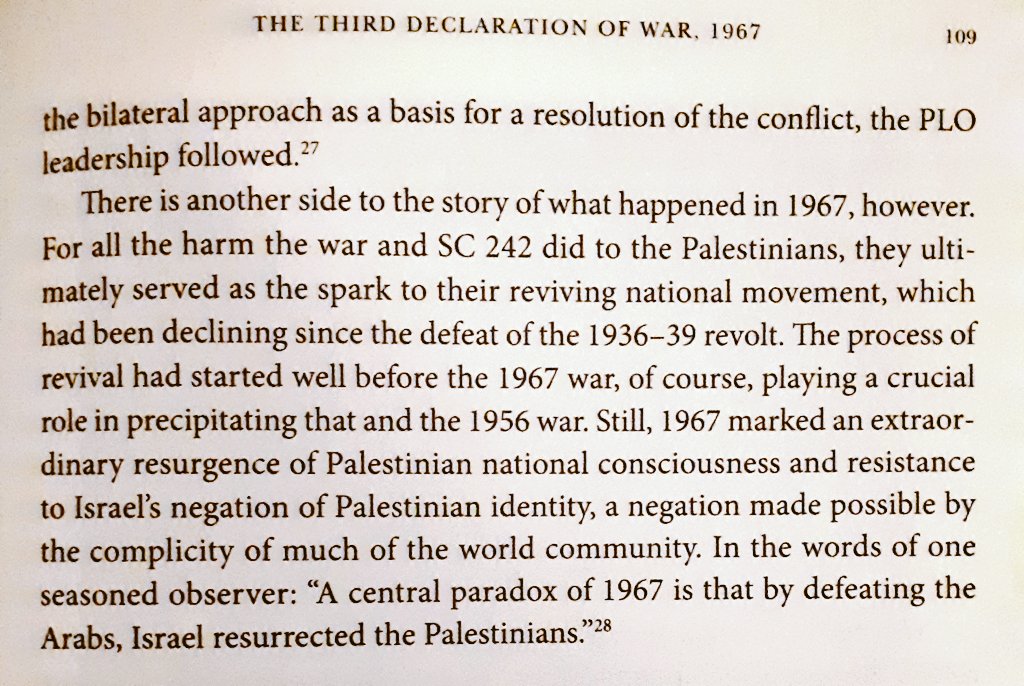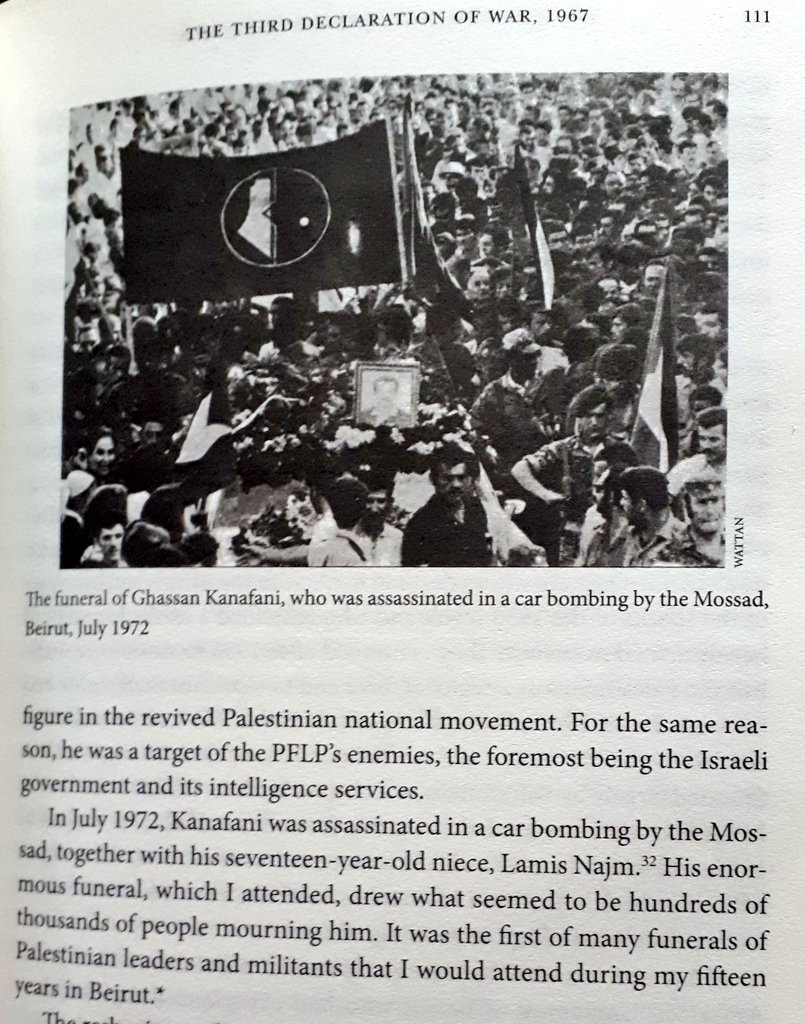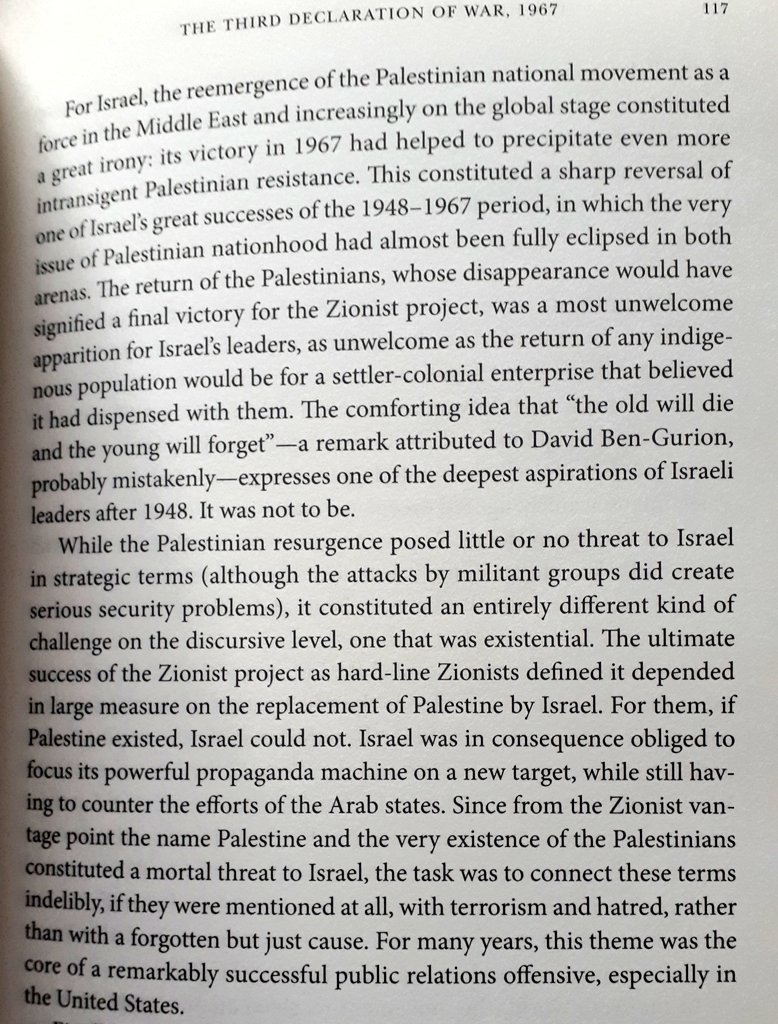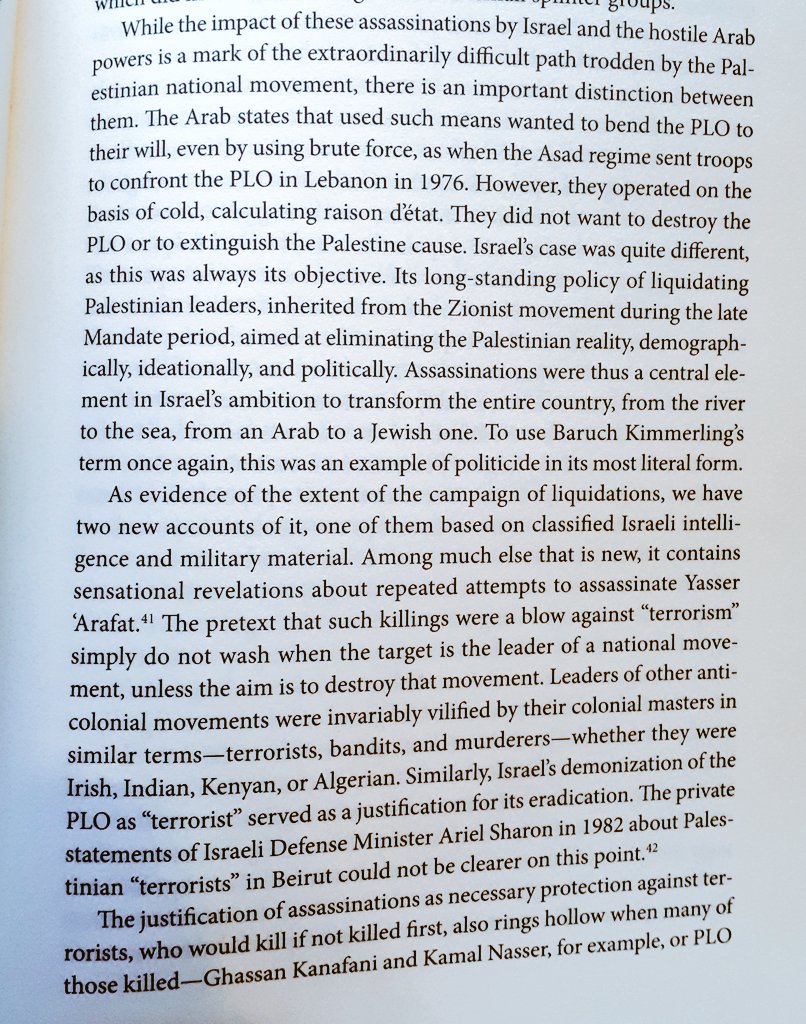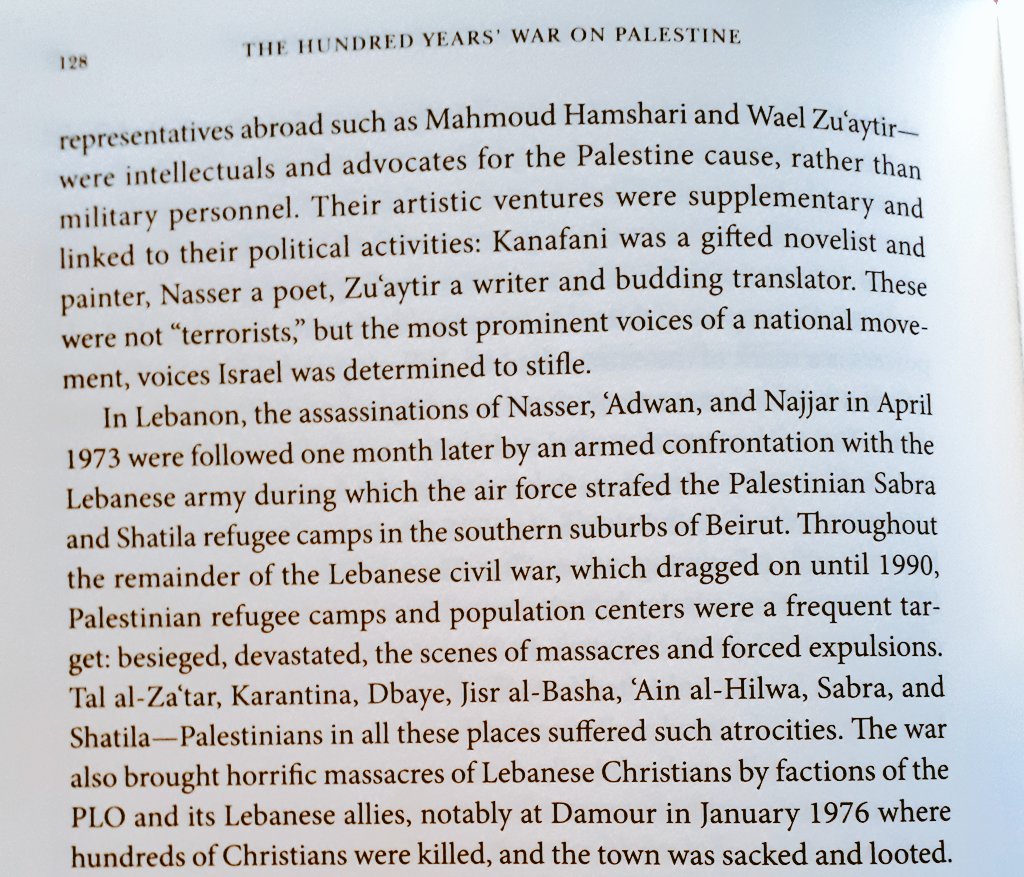"We are a nation threatened by disappearance" - & #39;Isa and Yusuf al-& #39;Isa, Filastin, May 7, 1914
[Yusuf Diya] "knew perfectly well that there was no way to reconcile Zionism& #39;s claims on palestine and its explicit aim of Jewish statehood and sovereignty there with the rights and well-being of the country& #39;s indigenous inhabitants"
In a 7 page letter to Theodore Herlz, Yusuf Diya pleaded that
"Nothing could be more just and equitable", than for "the unhappy Jewish nation" to find a refuge elsewhere. But, he concluded with a heart-felt plea, "in the name of God, let Palestine be left alone"
"Nothing could be more just and equitable", than for "the unhappy Jewish nation" to find a refuge elsewhere. But, he concluded with a heart-felt plea, "in the name of God, let Palestine be left alone"
"This condescending attitude [of Herlz& #39; reply] toward the intelligence, not to speak of the rights, of the Arab population of Palestine was to be serially repeated by Zionist, British, European and American leaders in the decades that followed, down to the present day"
"The dismantling of indigenous Palestinian society was set in motion by the large-scale immigration of European Jewish settlers supported by the newly established British Mandate authorities ... a separate Jewish-controlled sector of the economy was created "Avoda ivrit"
"The indigenous population was further diminished by the crushing repression of the Great 1936-39 Arab Revolt against British rule, during which 10 percent if the adult male population was killed, wounded, imprisoned, or exiled"
"the modern history of Palestine can be best understood in these terms: as a colonial war waged against the indigenous population, by a variety of parties, to force them to relinquish their homeland to another people against their will"
"For over a century, Palestinians have been depicted in precisely the same language by their colonizers as have been other indigenous peoples.. The Jewish state, Herlz wrote, would "form a part of a wall of defence for Europe in Asia, an outpost of civilization against barbarism"
"A land without a people for a people without a land," used by Christian supporters of a Jewish Palestine, as well as early Zionists like Israel Zangwill. Palestine was terra nullius to those who came to settle it, with those living there nameless and amorphous"
"The 1917 Balfour Declaration ... never mentioned the Palestinians, the great majority of the country& #39;s population at the time, even as it set the course for Palestine for the subsequent century"
"Significantly, many early apostles of Zionism had been proud to embrace the colonial nature of their project. The eminent Revisionist Zionist leader Ze& #39;ev Jabotinsky, godfather of the political trend that has dominant Israel since 1977 ... was especially clear about this"
"As Jabotinsky put it: "Zionist colonisation ... can proceed and develop only under the protection of a power that is independent of the native population - behind an iron wall, which the native population cannot breach"
"The social and economic institutions founded by the early Zionists, which were central to the success of the Zionist project, were all unquestioningly understood by all and described as colonial"
"Only the British had the means to wage the colonial war that was necessary to suppress Palestinian resistance to the takeover of their country. This war has continued since then, waged sometimes overtly and sometimes covertly"
"These six events, from the 1917 issuance of the Balfour Declaration ... to Israel& #39;s siege of the Gaza strip ... highlight the colonial nature of the hundred years& #39; war on Palestine, and also the indispensable role of external powers in waging it"
"But we cannot overlook the formidable international and imperial forces arrayed against [the Palestinians], the scale of which has often been dismissed, and in spite of which they have displayed remarkable resilience"  https://abs.twimg.com/emoji/v2/... draggable="false" alt="🇵🇸" title="Flag of Palestinian Territories" aria-label="Emoji: Flag of Palestinian Territories">
https://abs.twimg.com/emoji/v2/... draggable="false" alt="🇵🇸" title="Flag of Palestinian Territories" aria-label="Emoji: Flag of Palestinian Territories">
"In spite of marked religious distinctions between them and their neighbours, [Mizrahi or Sephardic Jews] were not foreigners, nor were they Europeans or settlers: they were, saw themselves, and were seen as Jews who were part of the indigenous Muslim-majority society"
"the Ottoman Empire overall was dealt the heaviest wartime losses [in WW1] of any major combatant power ... Most of these casualties were civilians (.. victims of massacres at the behest of the Ottoman authorities in 1915 & 1916 - Armenians, Assyrians, and other Christians)"
"In the soft, deceptive language of diplomacy, with its ambiguous phrase approving "the establishment in Palestine of a national home for the Jewish people", the declaration effectively pledged Britains support for Herlz& #39;s aims of Jewish statehood.. in the whole of Palestine"
"However important the other motivations may have been, this was the central one: the British Empire was never motivated by altruism. Britain& #39;s strategic interests were perfectly served by its sponsorship of the Zionist project"
"Lloyd George, Balfour, and Winston Churchill - assured Weizmann that by the term & #39;jewish national home& #39; they & #39;always meant an eventual Jewish state.& #39; Lloyd George convinced the Zionist leader that for this reason Britain would never allow representative government in Palestine"
"Whether intended this way or not, the declaration launched a full-blown colonial conflict, a century-long assault on the Palestinian people, aimed at fostering an exclusivist "national home" at their expense"
"The denial of an authentic, independent Palestinian identity is of a piece with Herlz& #39;s colonialist views on the alleged benefits of Zionism to the indigenous population, & constitutes a crucial element in the erasure of their national rights and peoplehood"
"As soon as they were able to in the wake of World War I, Palestinians began to organize politically in opposition to both British rule and.. the Zionist movement.. popular dissatisfaction.. exploded into demonstrations, strikes, riots with violence flaring in 1920, 1921, & 1929"
"The roots of what the Israeli sociologist Baruch Kimmerling called the "politicide" of the Palestinian people are on full display in the Mandate& #39;s preamble. The surest way to eradicate a people& #39;s right to their land is to deny their historical connection to it"
"The experience in Palestine was dissimilar to that of most other colonized peoples in this era [interwar period 1918-1939] in that the Mandate brought an influx of foreign settlers whose mission it was to take over the country"
"The frustration of the Palestinian population at their leadership& #39;s ineffective response over fifteen years ... finally led to a massive grassroots uprising. This started with a six-month general strike ... the strike eventually developed into the great 1936-39 revolt"
"Of all the services Britain provided to the Zionist movement before 1939, perhaps the most valuable was the armed suppression of Palestinian resistance in the form of the revolt ... The bloody war ... was the best illustration of the unvarnished truths uttered by Jabotinsky"
"Infuriated by rebels ambushing their convoys and blowing up their trains, the British resorted to tying Palestinian prisoners to the front of armoured cars and locomotives to prevent rebel attacks, a tactic they had pioneered in a futile effort to crush resistance of the Irish"
"In December [1938], Haining reported to the War Office that "practically every village in the country harbours and supports the rebels and will assist in concealing their identity from the Government Forces"
" & #39;If you wish to colonize a land in which people are already living,& #39; Jabotinsky wrote in 1925, & #39;you must find a garrison for the land ... Zionism is a colonizing venture and, therefore, it stands or falls on the question of armed forces& #39; "
"the commissioners reported that none of the military experts they consulted & #39;believed that the Zionist program could be carried out except by force of arms& #39; and all considered that a force of & #39;not less than 50,000 soldiers would be required& #39; to execute the program"
"What the Palestinians might have done to get out of this triple bind ... this thesis suggests, they should have broken completely with the British, refused to cooperate with the Mandate (as had the Congress Party with the Raj in India or Sinn Fein with the British in Ireland)"
"When the British left Palestine in 1948, there was no need to create the apparatus of a Jewish state ab novo. That apparatus had in fact been functioning under the British aegis for decades ... the fate of Palestine had thus been decided thirty years earlier"
"By the summer of 1949 ... some 80 percent of the Arab population of the territory that at war& #39;s end became the new state of Israel had been forced from their homes and lost their lands and property. At least 720,000 of the 1.3 million Palestinians were refugees"
"For the first time, the Zionist movement openly called for turning all of Palestine into a Jewish state: the exact demand was that Palestine be established as a Jewish Common-Wealth ... this was another circumlocution for full Jewish control over the entirety of Palestine"
"whereby Egypy, Iraq, Syria, Lebanon and Transjordan originally agreed to create the (Arab) League, had stressed the importance of the & #39;cause of the Arabs of Palestine& #39; ... these states were barely independent of their former colonial masters"
"The American and Zionist preference was for these unfortunates [hundreds of thousands of displaced Jewish holocaust survivors in Europe] to be granted immediate entry to Palestine (neither the US nor the UK being willing to accept them)"
"However much Arab leaders may have wished to demonstrate their postwar independence, the poor, backward states they led were entangled in a thick web of dependency, based on unequal treaties, continued foreign military occupation, and external control of their natural resources"
"The British soon found themselves unable to master the armed opposition ... they themselves had reinforced ... Reeling from deep postwar economic and financial problems and the unwinding of the centuries-old Indian Raj, Great Britain finally capitulated in Palestine"
"The resolution (General Assembly - 181) was another declaration of war, providing the international birth certificate for a Jewish state in most of what was still an Arab-majority land, a blatant violation of the principle of self determination enshrined in the UN Charter"
"The catastrophe that ensued for the Palestinians was thus the product not only of their own Arab weaknesses and Zionist strength, but also of events as far afield as London, Washington, DC, Moscow, New York, and Amman"
"Like a slow, seemingly endless track wreck, the Nakba unfolded over a period of many months.. Thus, the ethnic cleansing of Palestine began well before the state of Israel was proclaimed.. most of Palestine& #39;s Arab urban population thus became refugees and lost their homes"
"People fled as news spread of massacres like that on April 9, 1948, in the village of Dayr Yasin near Jerusalem, where one hundred residents, sixty-seven of them women, children, and old people, were slaughtered when the village was stormed by Irgun and Haganah assailents"
"In this first phase of the Nakba before May 15, 1948, a pattern of ethnic cleansing resulted in the expulsion & panicked departure of about 300,00 Palestinians overall and the devastation of many of the Arab majority& #39;s key urban economic, political, civic, and cultural centres..
.. The second phase followed after May 15, when the new Israeli army defeated the Arab armies that joined the war ... In the wake of the defeat of the Arab armies, and after further massacres of civilians, an even larger number of Palestinians, another 400,000, were expelled"
"Still more were expelled from the new state of Israel even after the armistice agreements if 1949 were signed, while further numbers have been forced out since then. In this sense the Nakba can be understood as an ongoing process"
"the systemic ethnic cleansing of the Arab-inherited areas of the country seized during the war; and the theft of Palestinian land and property left behind by refugees ... there would have been no other way to achieve a Jewish majority, the explicit aim of political Zionism"
"As the historian Avi Shlaim noted, "It is hardly an exaggeration to say that" British Foreign Secretary Ernest Bevin "colluded directly with the Transjordanians and indirectly with the Jews to abort the birth if a Palestinian Arab state"
"Notwithstanding the widely accepted assertion that the Israeli army was dwarfed by seven invading Arab armies, we know that in 1948 Israel in fact outnumbered and outgunned its opponents"
"Despite theur already tense postwar rivalry, both [the USSR & the US] had supported the partition of Palestine ... Once the state of Israel was established, they both recognized it and offered crucial military support, which was instrumental in its victory"
"For all Palestinians, no matter their different circumstances, the Nakba formed an enduring touchstone of identity, one that has lasted through several generations. It marked an abrupt collective disruption, a trauma every Palestinian shares in one way or another"
"Accustomed to being a substantial majority in their own country and region, [those who remained] suddenly had to learn to make their way as a despised minority in a hostile environment as subjects of a Jewish polity that never defined itself as a state of all its citizens"
"Displaced Palestinians who now lived outside the borders of the state of Israel - indeed the majority of the Palestinian people - were refugees ... Those who had fled to Syria, Lebanon, and Jordan ... most of them found themselves in refugee camps managed by the UNRWA"
"The Palestine issue thus became a political football exploited at will by opportunistic politicians ... Palestinians witnessing this cynical game eventually realized that if anything was to be done about their cause, they would have to do it themselves"
"Transmitted through acolytes such as Moshe Dayan, Yitzhak Rabin, and Ariel Sharon, Ben-Gurion& #39;s belligerent policies [of unremitting application of force toward Palestinians & neighbouring states] have pervaded the Israeli government& #39;s dealings with it& #39;s neighbours ever since"
"Thus a few bloody raids launched in the early 1950s by small Palestinian militant groups, ultimately led Israel launching the Suez war of October 1956. Israel did not do so alone, and its partners had their own reasons for attacking Egypt (Britain & France)"
"As the occupying Israeli troops swept through the Gaza towns and refugee camps of Khan Yunis and Rafah in November 1956, more than 450 people, male civilians, were killed, most of them summarily executed"
"[Israel& #39;s] forces were much stronger than the Arab armies in 1967, & the country was never in any danger of losing a war, even if the Arabs had struck first. Yet the myth prevails: in 1967, a tiny, vulnerable country faced constant, existential peril, and it continues to do so"
"What we had witnessed that day (June 10th 1967) was evidence of a new Middle Eastern axis in action - the armoured spearheads on the ground were Israeli, while the diplomatic cover was American. It is an axis that is still in place today, over half a century later"
"If the Balfour Declaration and the Mandate constituted the first declaration of war on the Palestinian people ... and the 1947 UN resolution on the partition of Palestine represented the second one, the aftermath of the 1967 war produced the third such declaration"
"As [Israel] prepared in 1967 for a first strike against the Arab air forces, its leaders were determined to get prior American approval for their action, which they indeed obtained ... The Israeli military now had the green light it needed to launch a long-planned .. strike"
"Thanks in large part to [Security Council Resolution 242], a whole new layer of forgetting, of erasure and myth-making, was added to the induced amnesia that obscured the colonial origins of the conflict between Palestinians and Zionist settlers."
"1967 marked an extraordinary resurgence of Palestinian national conciousness and resistence to Israel& #39;s negation of Palestinian identity ... In the words of one seasoned observer: "A central paradox of 1967 is that by defeating the Arabs, Israel resurrected the Palestinians"
"In July 1972, Kanafani was assassinated in a car bombing by the Mossad, together with his seventeen-year-old niece"
"from the Zionist vantage point the name Palestine & the very existence of the Palestinians constituted a mortal threat to Israel, the task was to connect these terms indelibly, if they were mentioned at all, with terrorism and hatred, rather than with a forgotten but just cause"
Its long-standing policy of liquidating the Palestinian leaders, inherited from the Zionist movement during the late Mandate period, aimed at eliminating the Palestinians in reality .. Assassinations were thus a central element in Israel& #39;s ambition to transform the entire country
"Few images are more symbolic of the odds faced by the Palestinians during the Lebanon war than that of Israeli and Syrian officers [brokered by Kissinger in attempting to "break the back" of the PLO] looking on as LF commanders directed a massacre at a Palestinian refugee camp"

 Read on Twitter
Read on Twitter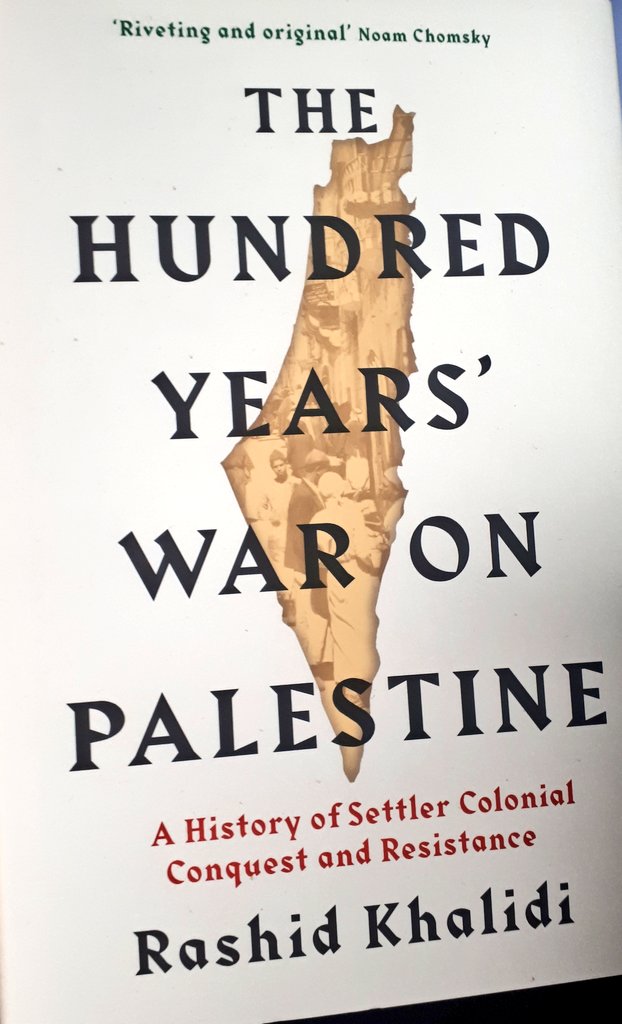
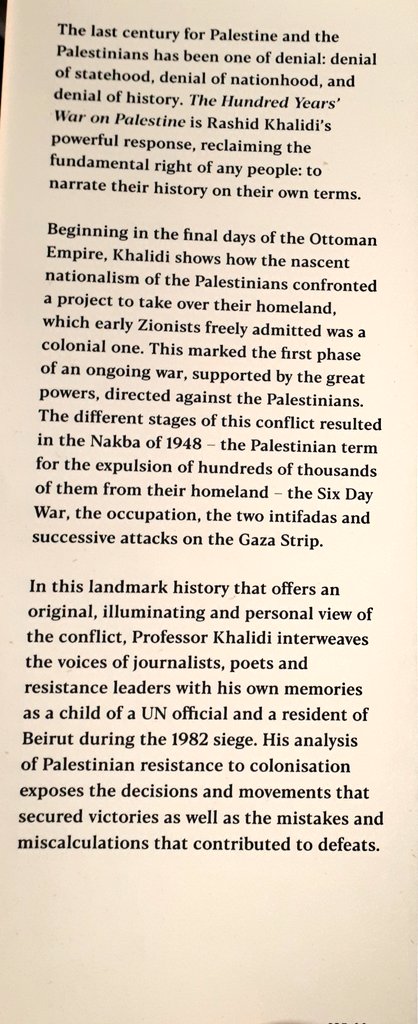
![[Yusuf Diya] "knew perfectly well that there was no way to reconcile Zionism& #39;s claims on palestine and its explicit aim of Jewish statehood and sovereignty there with the rights and well-being of the country& #39;s indigenous inhabitants" [Yusuf Diya] "knew perfectly well that there was no way to reconcile Zionism& #39;s claims on palestine and its explicit aim of Jewish statehood and sovereignty there with the rights and well-being of the country& #39;s indigenous inhabitants"](https://pbs.twimg.com/media/EXB_E5FWAAEuA9P.jpg)

!["This condescending attitude [of Herlz& #39; reply] toward the intelligence, not to speak of the rights, of the Arab population of Palestine was to be serially repeated by Zionist, British, European and American leaders in the decades that followed, down to the present day" "This condescending attitude [of Herlz& #39; reply] toward the intelligence, not to speak of the rights, of the Arab population of Palestine was to be serially repeated by Zionist, British, European and American leaders in the decades that followed, down to the present day"](https://pbs.twimg.com/media/EXCCEmeWkAEgbuL.jpg)
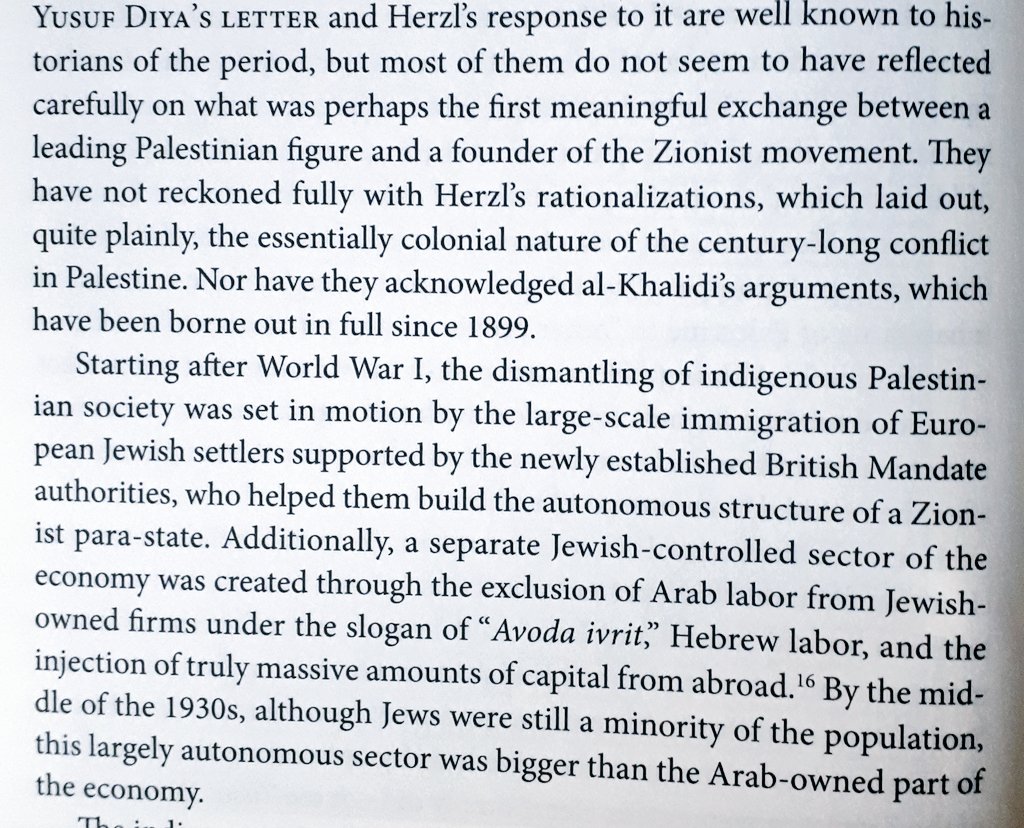
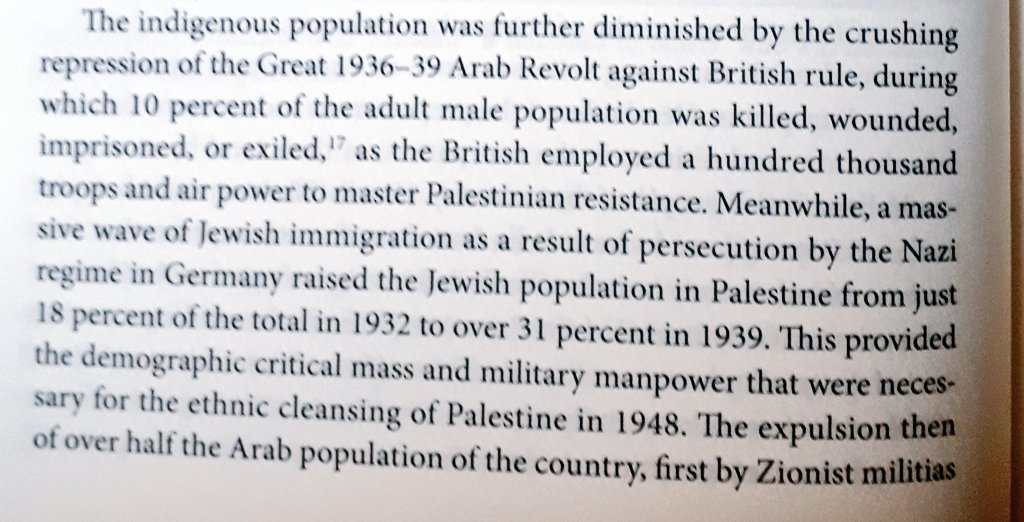
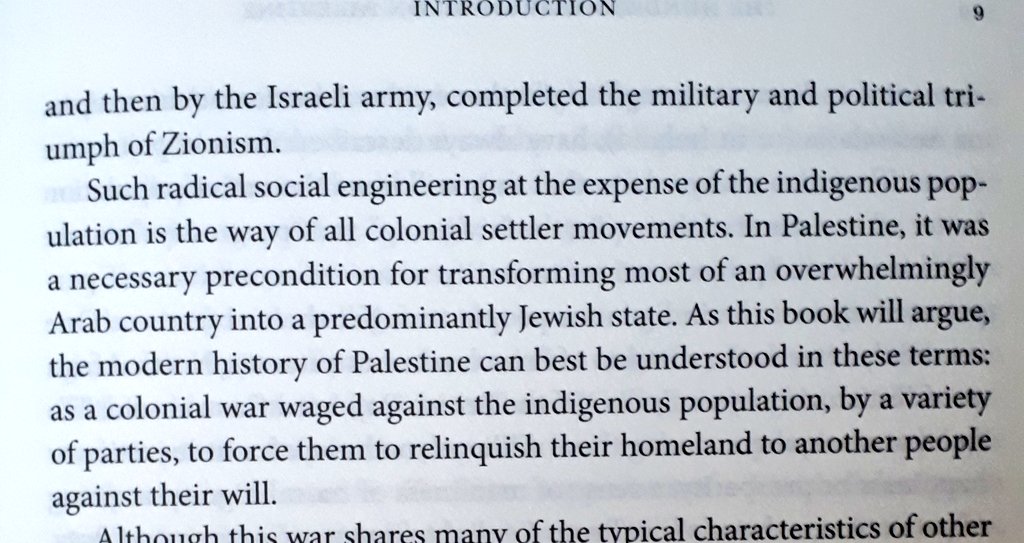
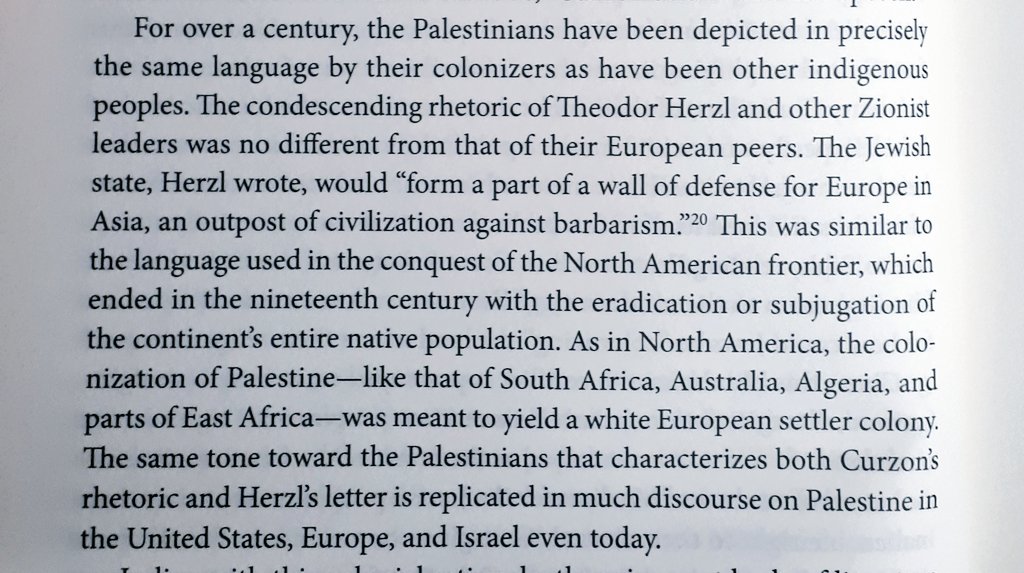
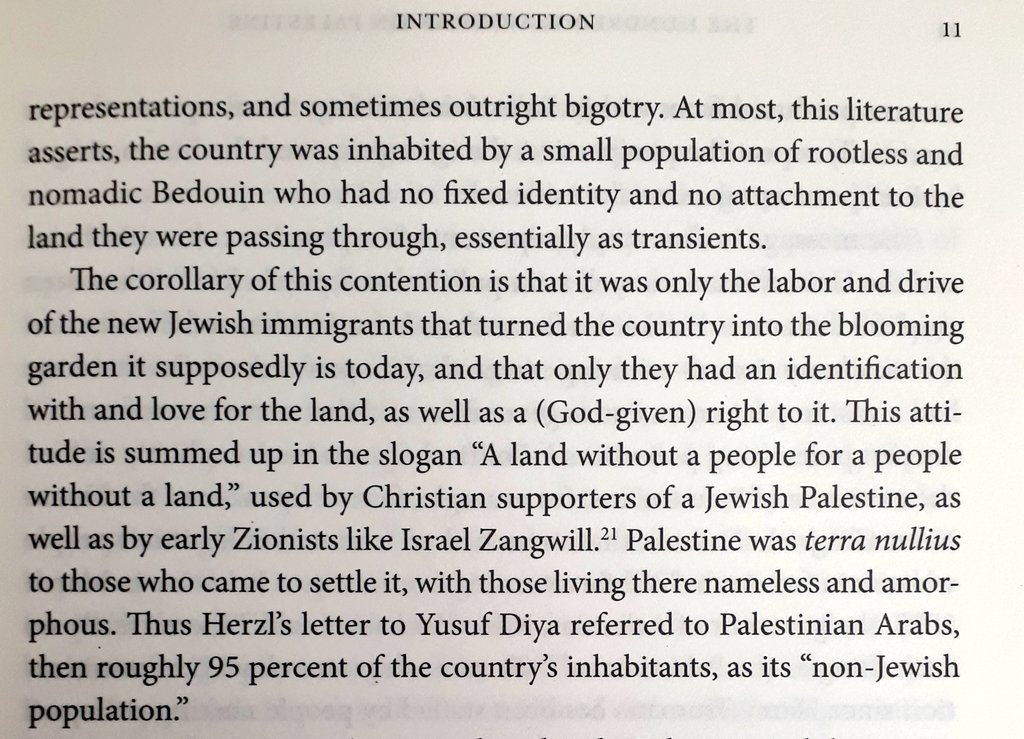

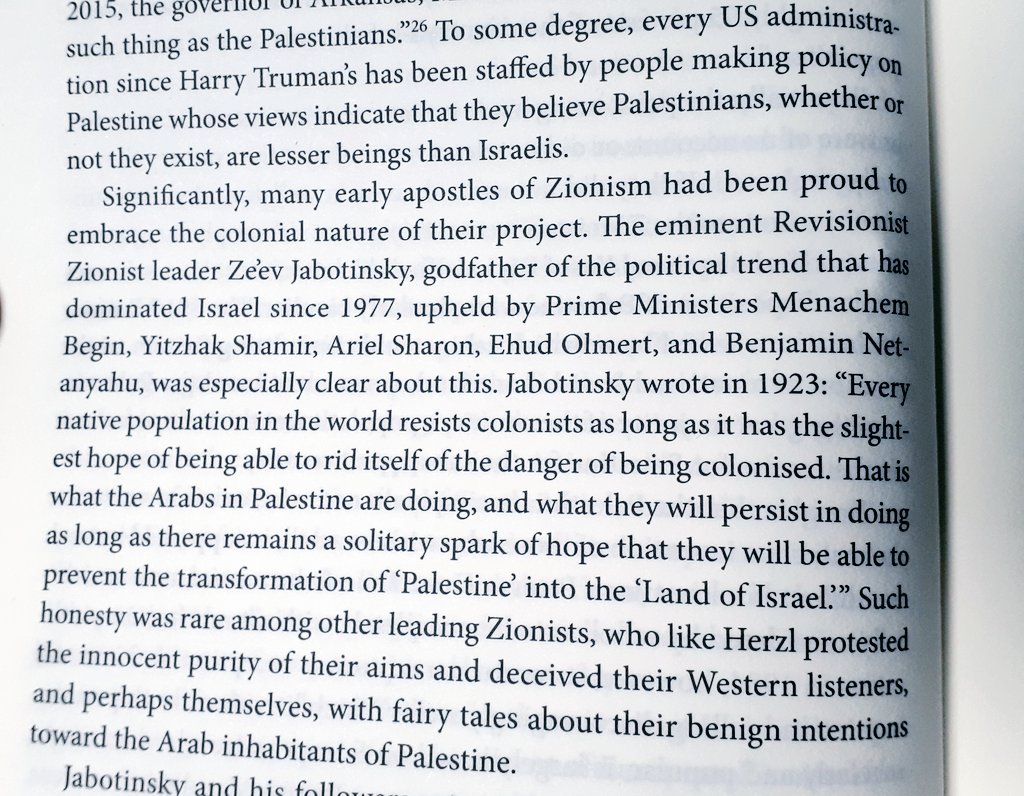
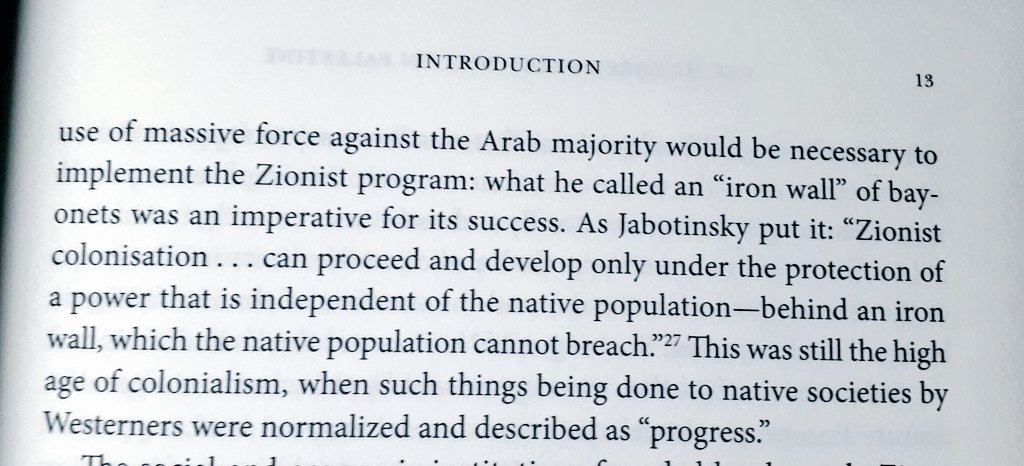
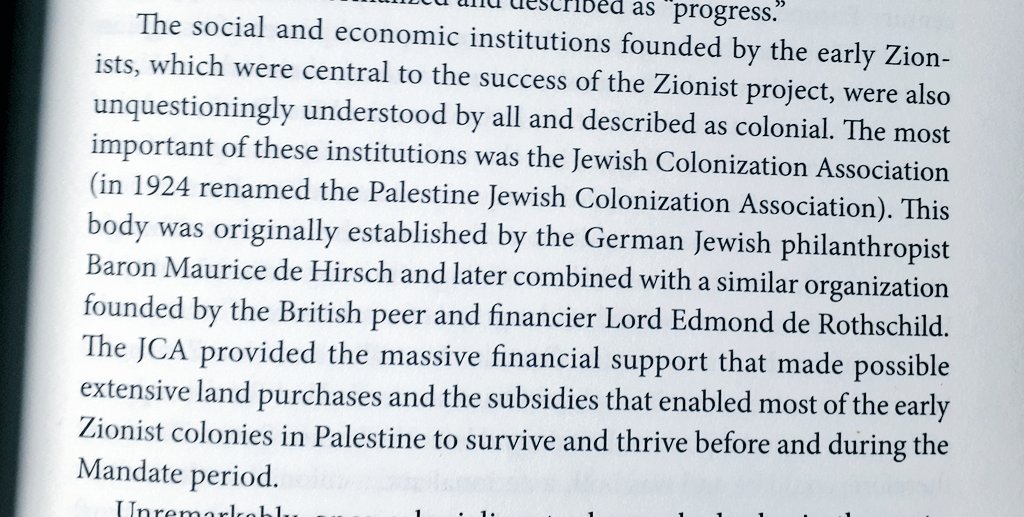
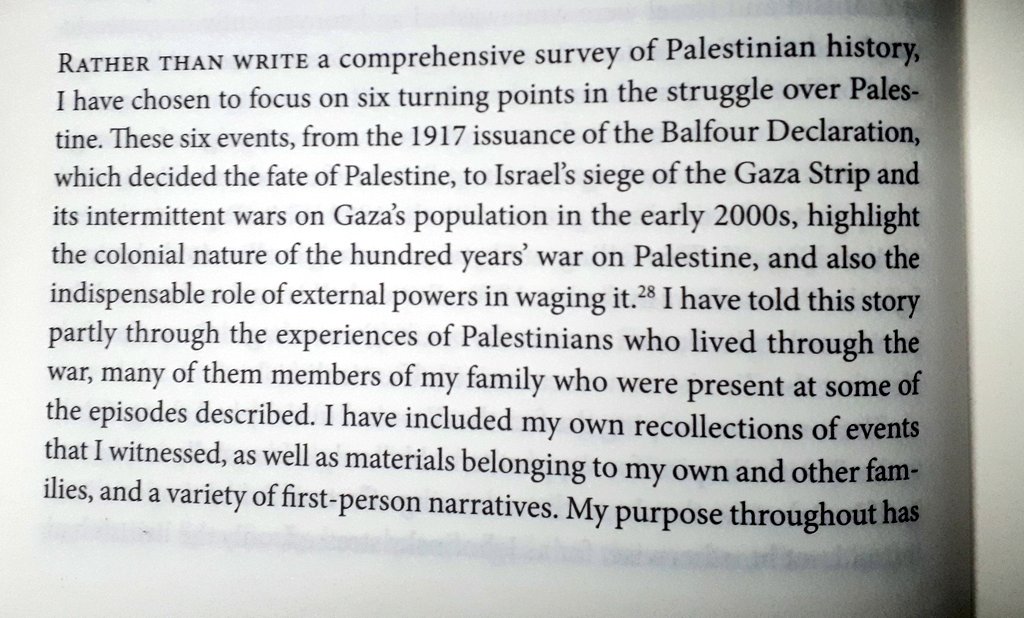
![Flag of Palestinian Territories "But we cannot overlook the formidable international and imperial forces arrayed against [the Palestinians], the scale of which has often been dismissed, and in spite of which they have displayed remarkable resilience" https://abs.twimg.com/emoji/v2/... draggable=](https://pbs.twimg.com/media/EXGalLyXkAAZA8x.jpg) " title=""But we cannot overlook the formidable international and imperial forces arrayed against [the Palestinians], the scale of which has often been dismissed, and in spite of which they have displayed remarkable resilience" https://abs.twimg.com/emoji/v2/... draggable="false" alt="🇵🇸" title="Flag of Palestinian Territories" aria-label="Emoji: Flag of Palestinian Territories">" class="img-responsive" style="max-width:100%;"/>
" title=""But we cannot overlook the formidable international and imperial forces arrayed against [the Palestinians], the scale of which has often been dismissed, and in spite of which they have displayed remarkable resilience" https://abs.twimg.com/emoji/v2/... draggable="false" alt="🇵🇸" title="Flag of Palestinian Territories" aria-label="Emoji: Flag of Palestinian Territories">" class="img-responsive" style="max-width:100%;"/>
!["In spite of marked religious distinctions between them and their neighbours, [Mizrahi or Sephardic Jews] were not foreigners, nor were they Europeans or settlers: they were, saw themselves, and were seen as Jews who were part of the indigenous Muslim-majority society" "In spite of marked religious distinctions between them and their neighbours, [Mizrahi or Sephardic Jews] were not foreigners, nor were they Europeans or settlers: they were, saw themselves, and were seen as Jews who were part of the indigenous Muslim-majority society"](https://pbs.twimg.com/media/EXgyj7rX0AEERdk.jpg)
!["the Ottoman Empire overall was dealt the heaviest wartime losses [in WW1] of any major combatant power ... Most of these casualties were civilians (.. victims of massacres at the behest of the Ottoman authorities in 1915 & 1916 - Armenians, Assyrians, and other Christians)" "the Ottoman Empire overall was dealt the heaviest wartime losses [in WW1] of any major combatant power ... Most of these casualties were civilians (.. victims of massacres at the behest of the Ottoman authorities in 1915 & 1916 - Armenians, Assyrians, and other Christians)"](https://pbs.twimg.com/media/EXg0pkEWoAIO1Hd.jpg)
!["the Ottoman Empire overall was dealt the heaviest wartime losses [in WW1] of any major combatant power ... Most of these casualties were civilians (.. victims of massacres at the behest of the Ottoman authorities in 1915 & 1916 - Armenians, Assyrians, and other Christians)" "the Ottoman Empire overall was dealt the heaviest wartime losses [in WW1] of any major combatant power ... Most of these casualties were civilians (.. victims of massacres at the behest of the Ottoman authorities in 1915 & 1916 - Armenians, Assyrians, and other Christians)"](https://pbs.twimg.com/media/EXg0qyDWkAIg9AX.jpg)
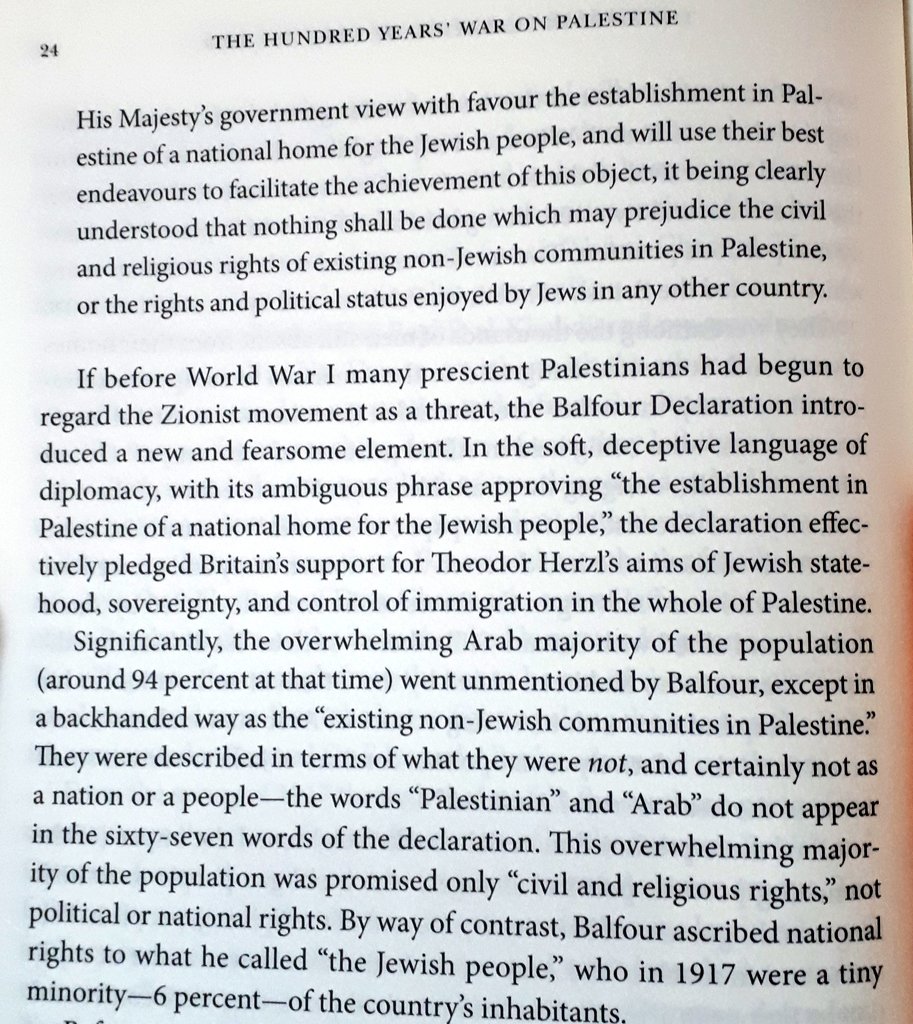
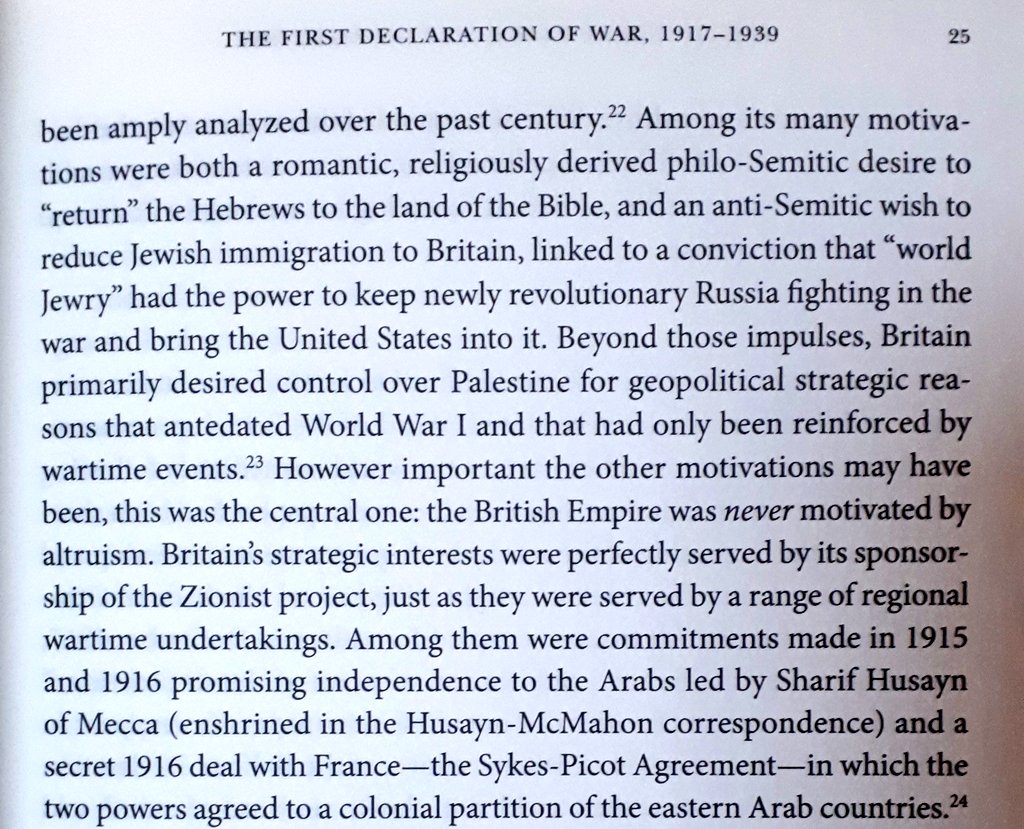
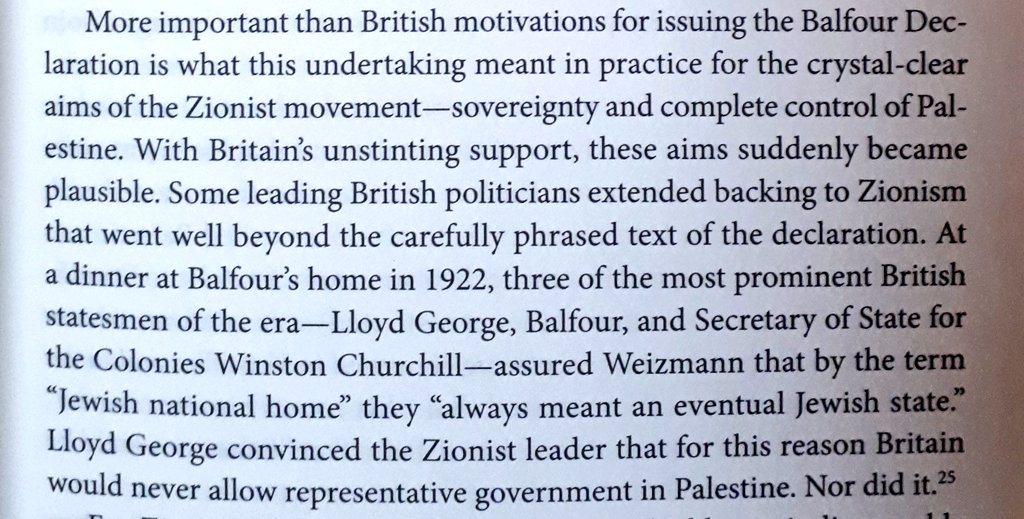

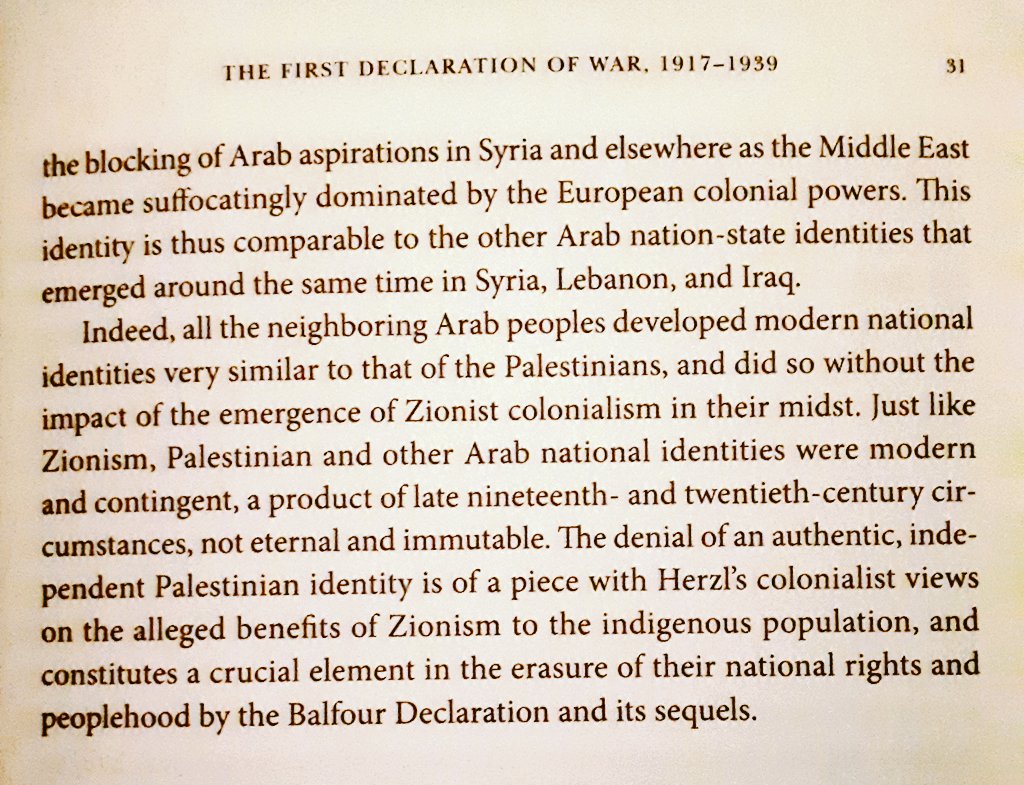

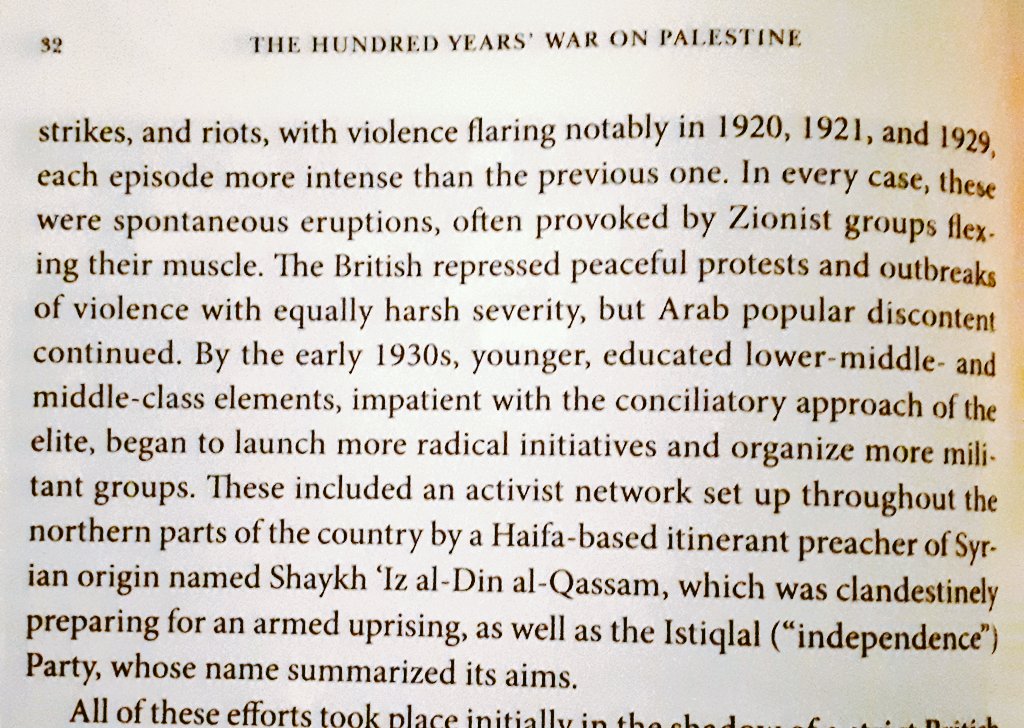

!["The experience in Palestine was dissimilar to that of most other colonized peoples in this era [interwar period 1918-1939] in that the Mandate brought an influx of foreign settlers whose mission it was to take over the country" "The experience in Palestine was dissimilar to that of most other colonized peoples in this era [interwar period 1918-1939] in that the Mandate brought an influx of foreign settlers whose mission it was to take over the country"](https://pbs.twimg.com/media/EXiN8dZX0AUFcwS.jpg)
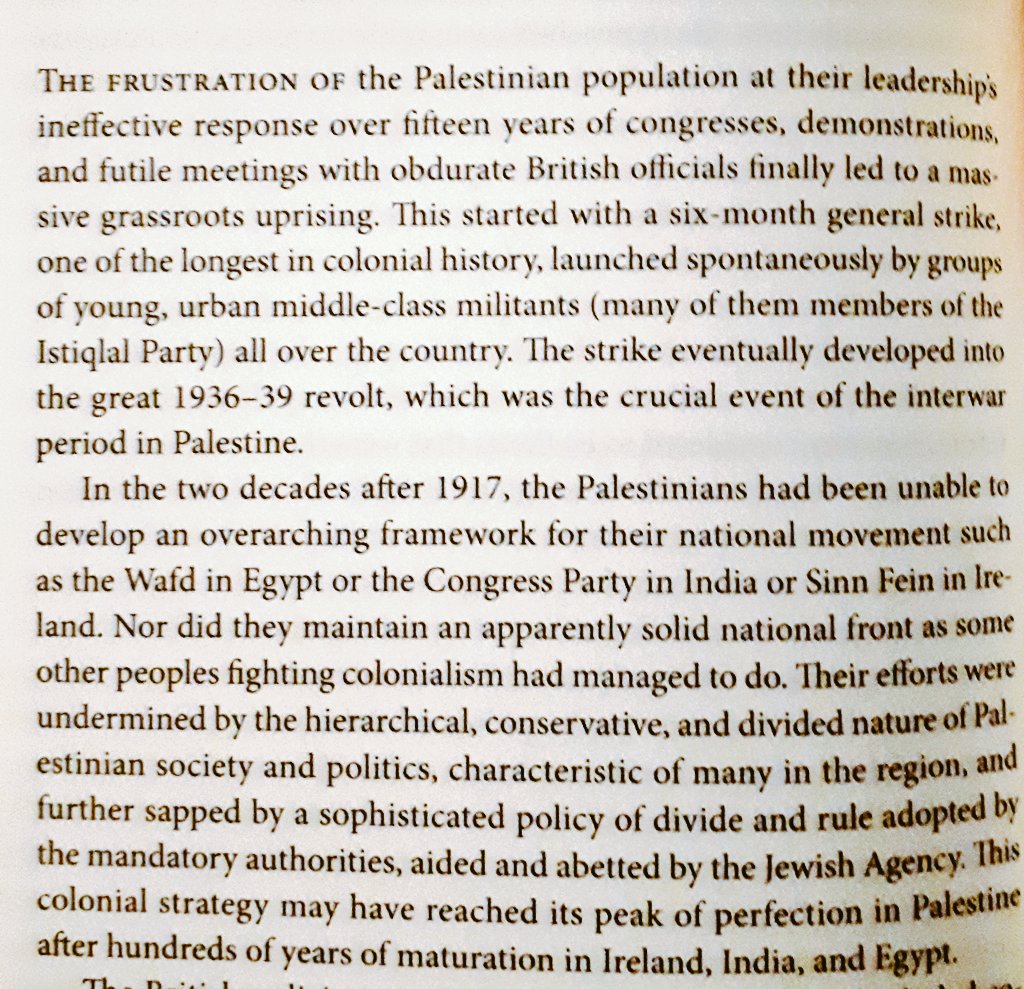

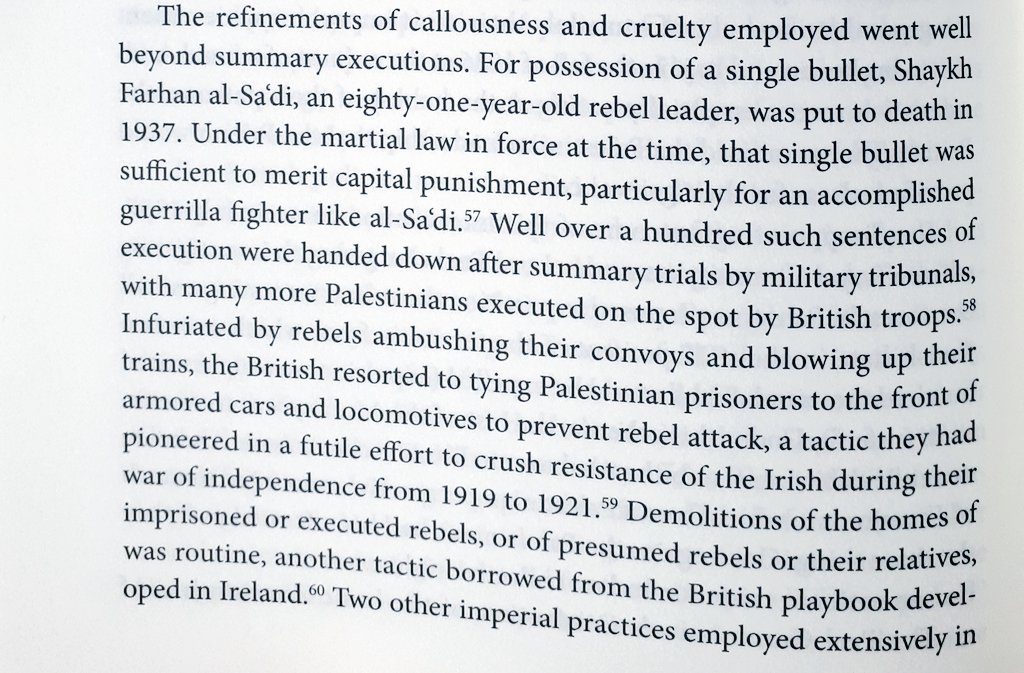
!["In December [1938], Haining reported to the War Office that "practically every village in the country harbours and supports the rebels and will assist in concealing their identity from the Government Forces" "In December [1938], Haining reported to the War Office that "practically every village in the country harbours and supports the rebels and will assist in concealing their identity from the Government Forces"](https://pbs.twimg.com/media/EXkzb05WoAI_XKb.jpg)

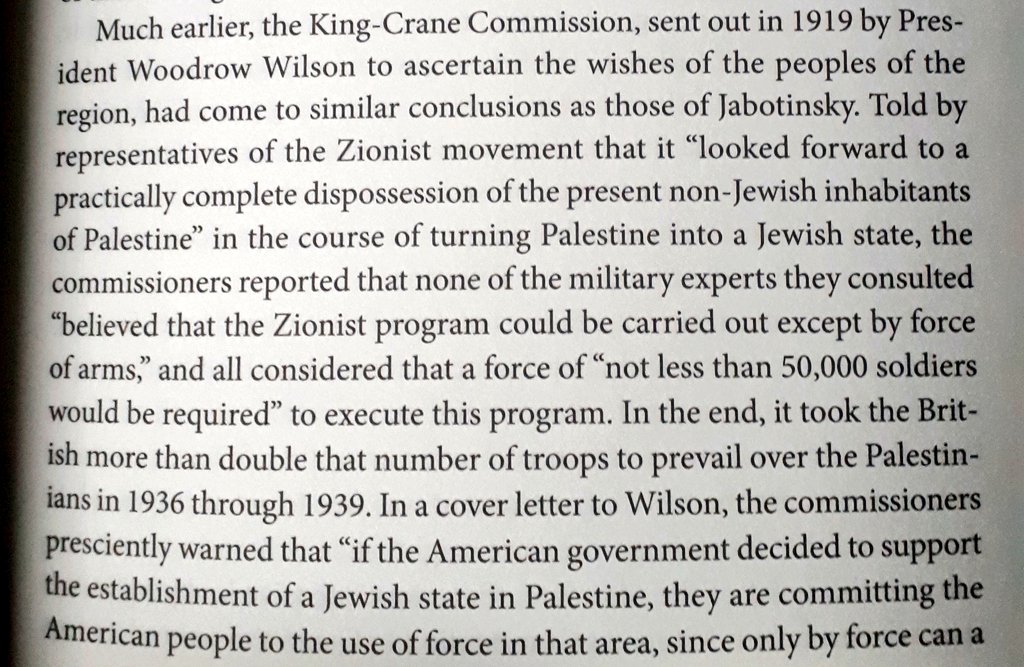
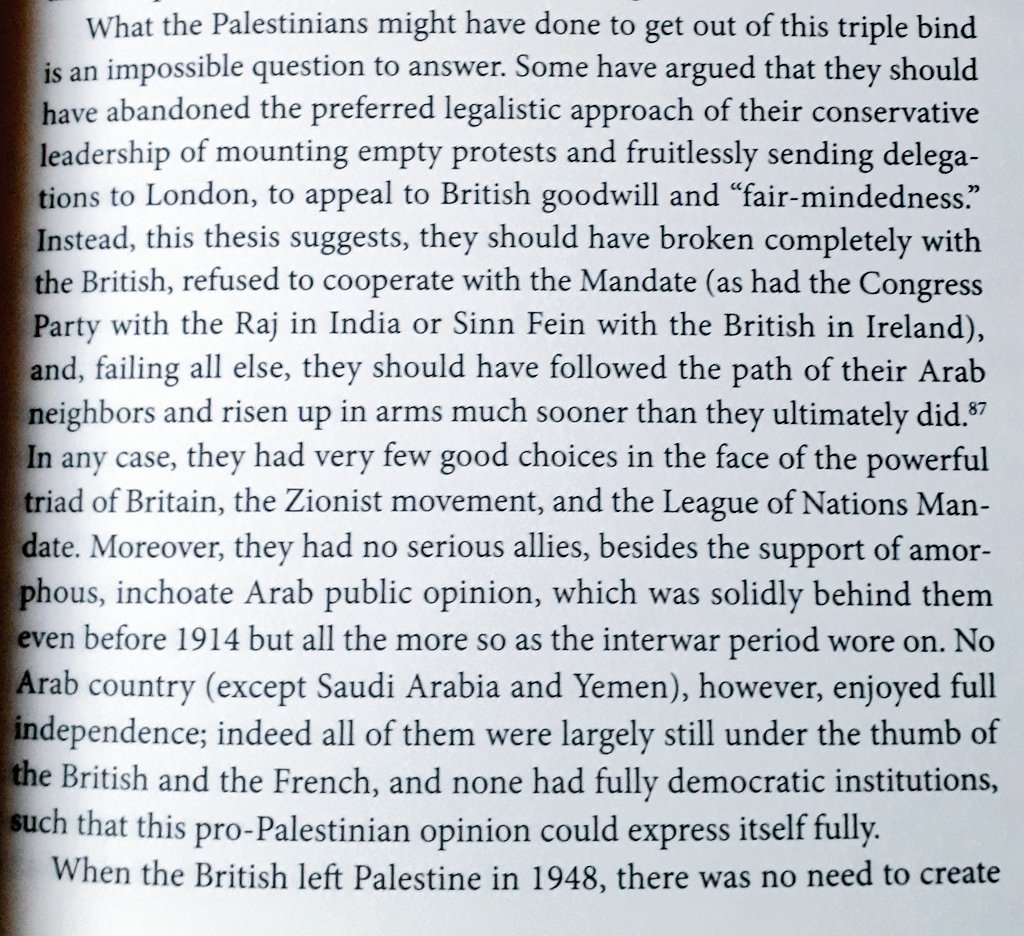
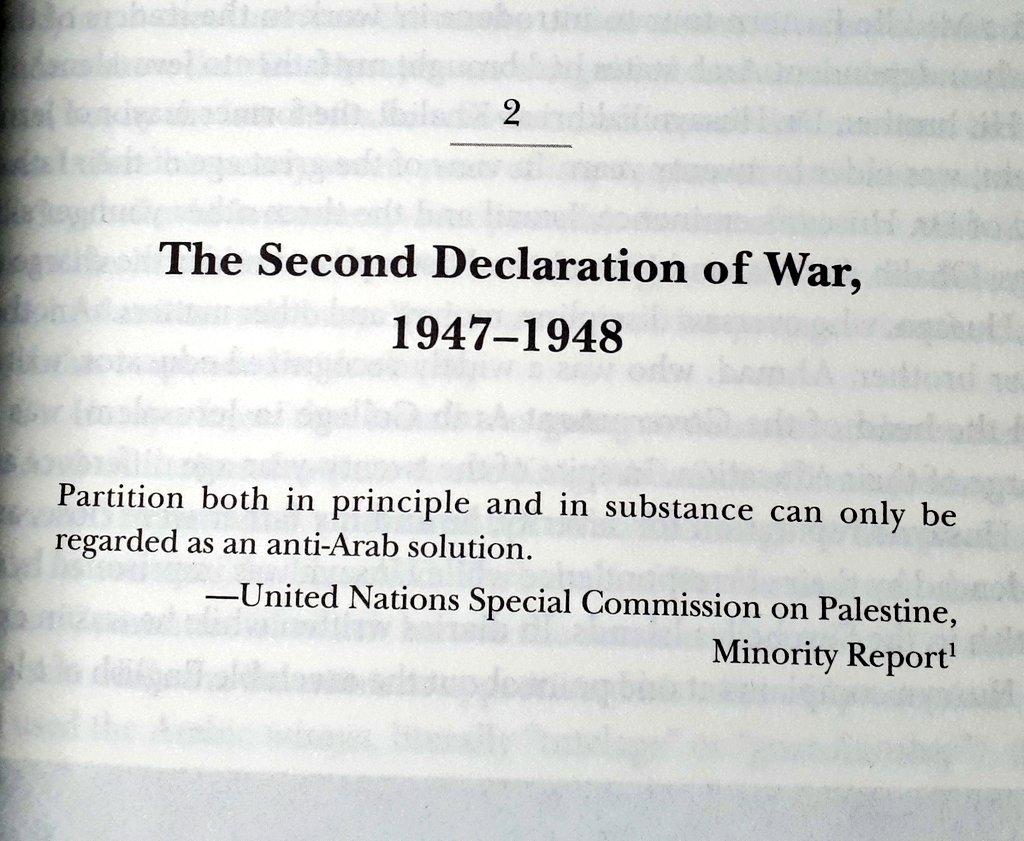
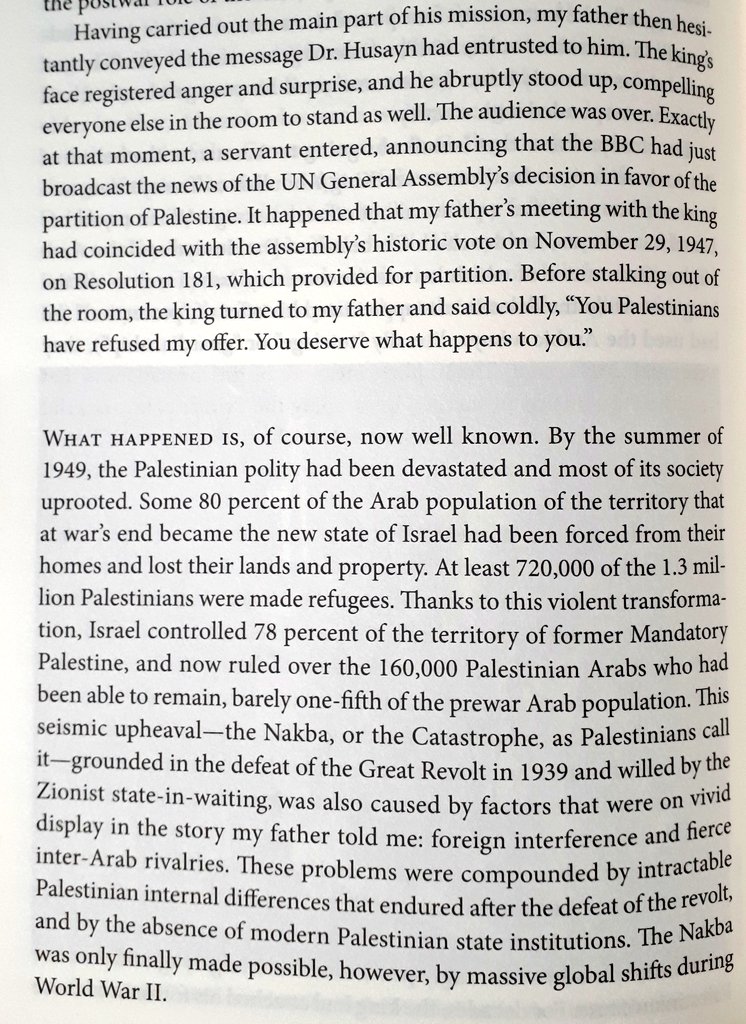

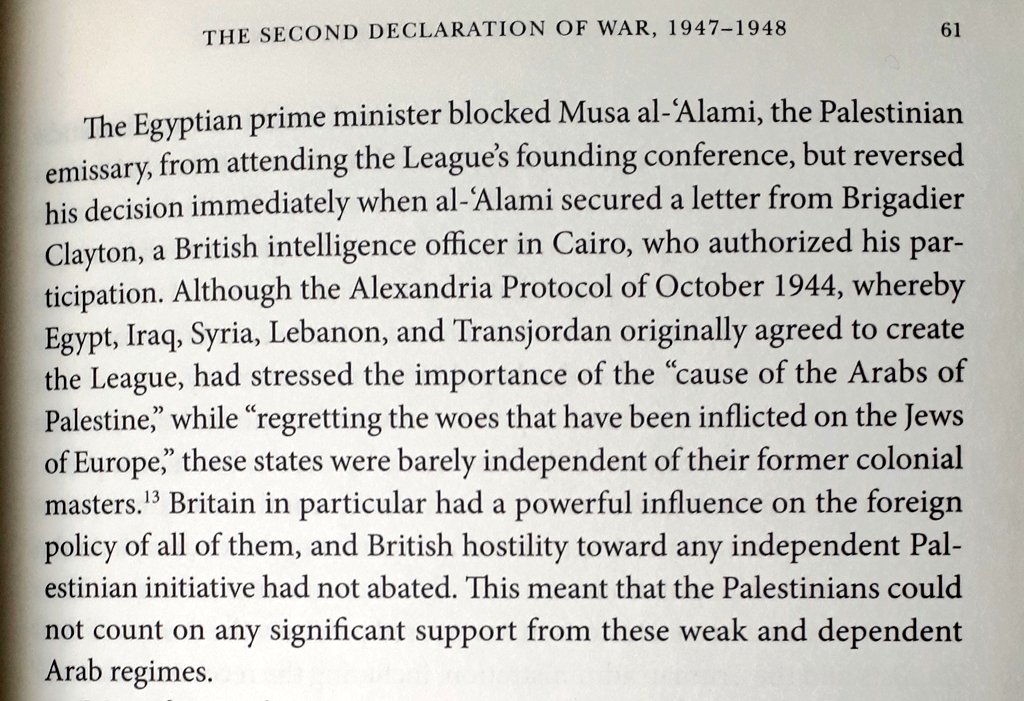
!["The American and Zionist preference was for these unfortunates [hundreds of thousands of displaced Jewish holocaust survivors in Europe] to be granted immediate entry to Palestine (neither the US nor the UK being willing to accept them)" "The American and Zionist preference was for these unfortunates [hundreds of thousands of displaced Jewish holocaust survivors in Europe] to be granted immediate entry to Palestine (neither the US nor the UK being willing to accept them)"](https://pbs.twimg.com/media/EYDpieaXsAAwRSu.jpg)

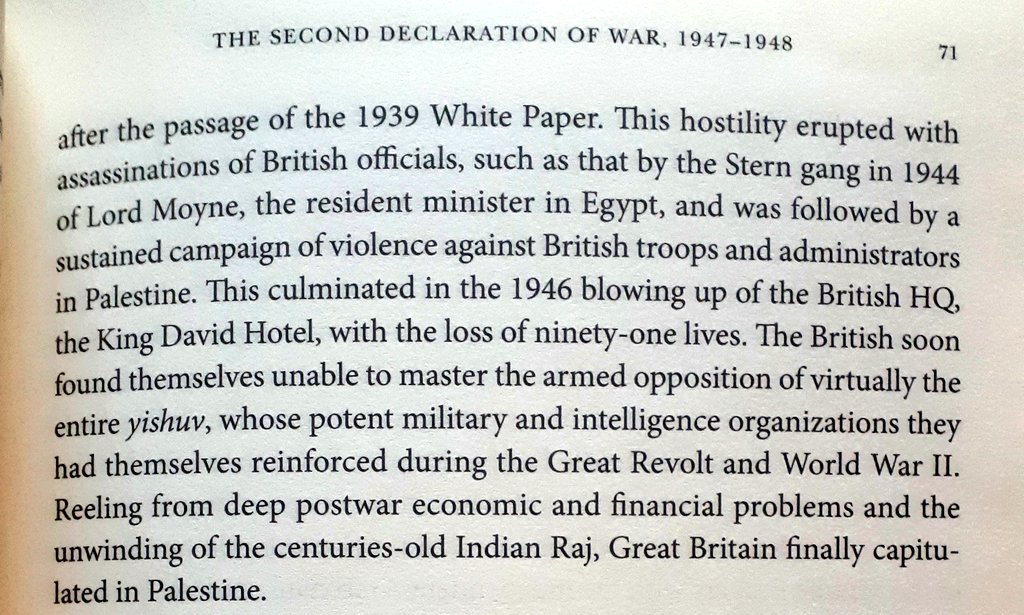
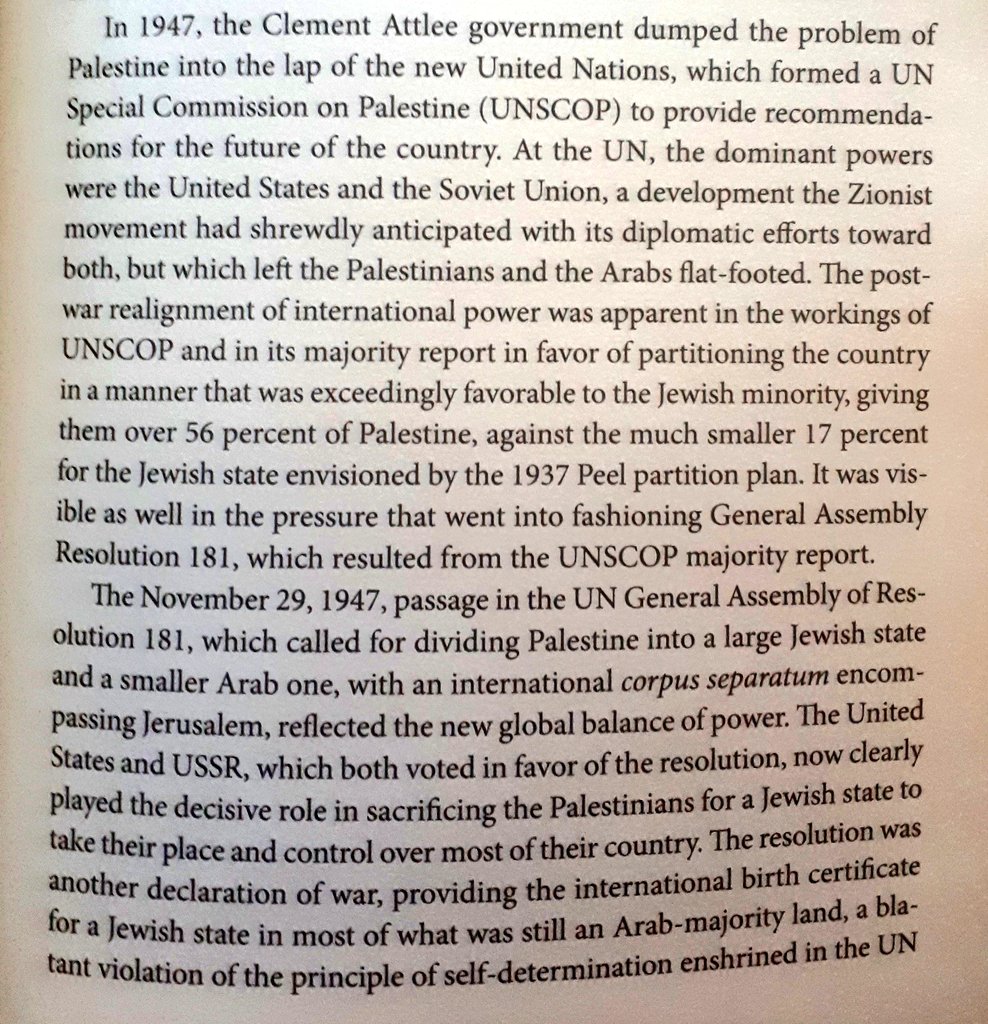
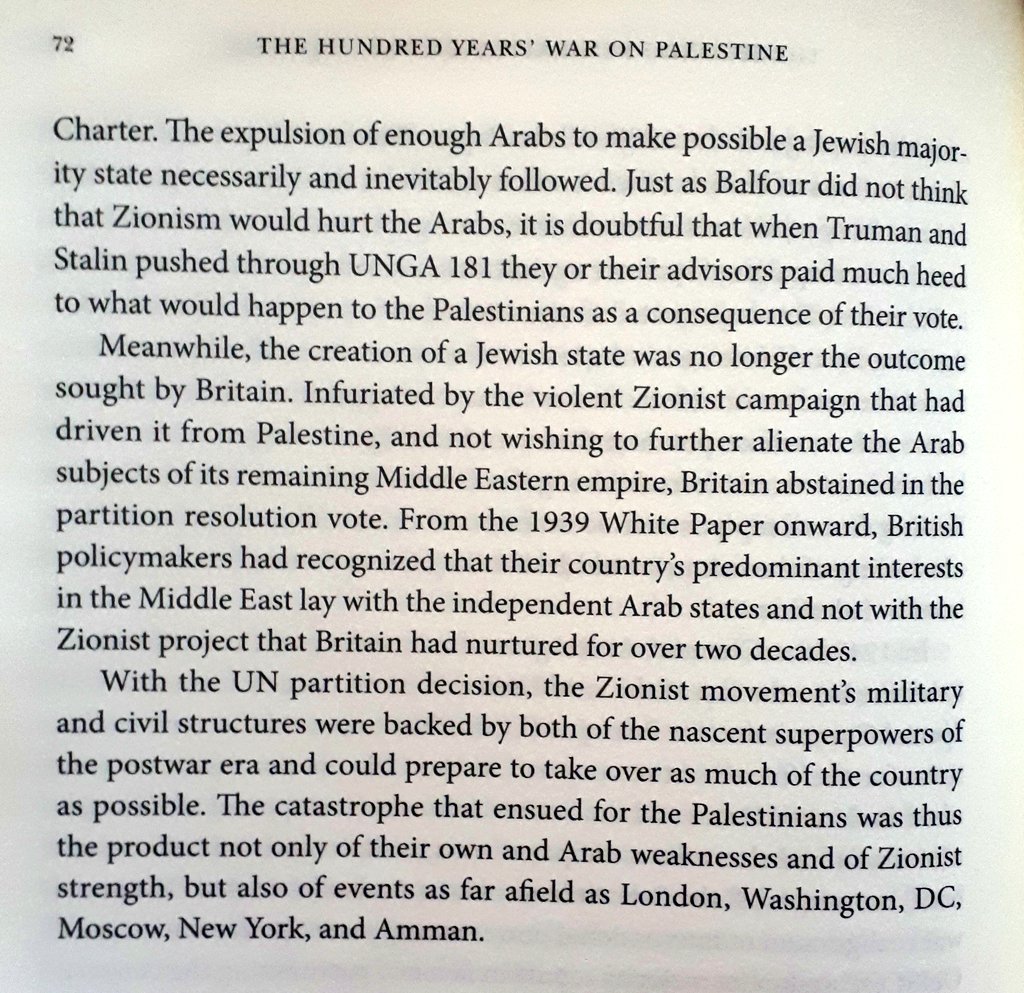

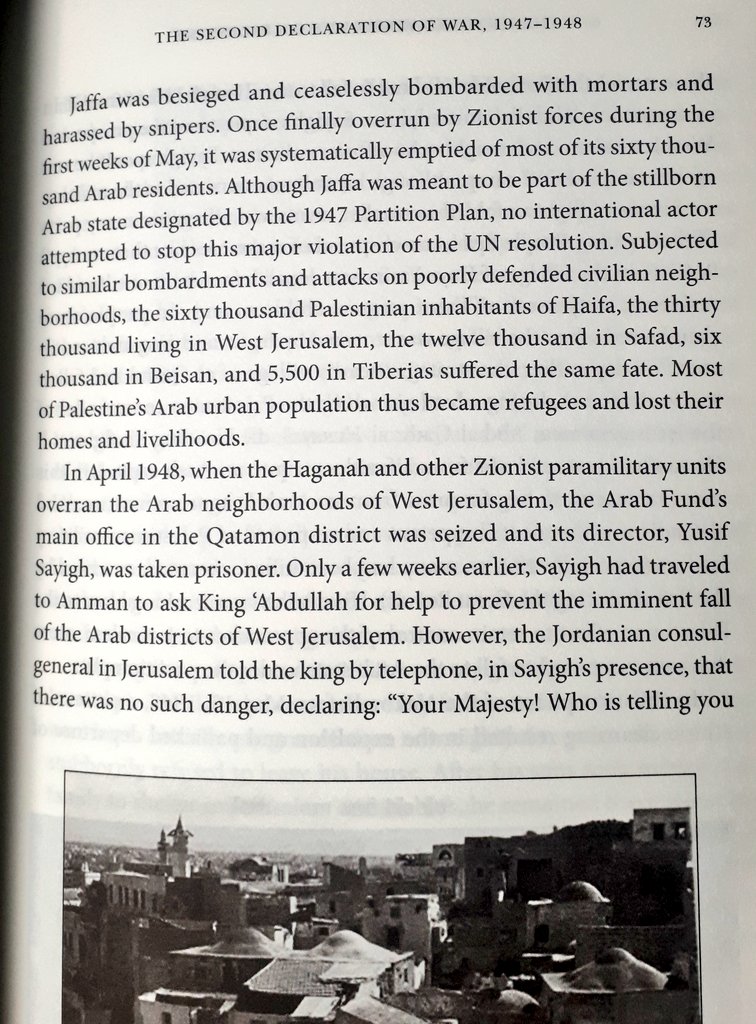
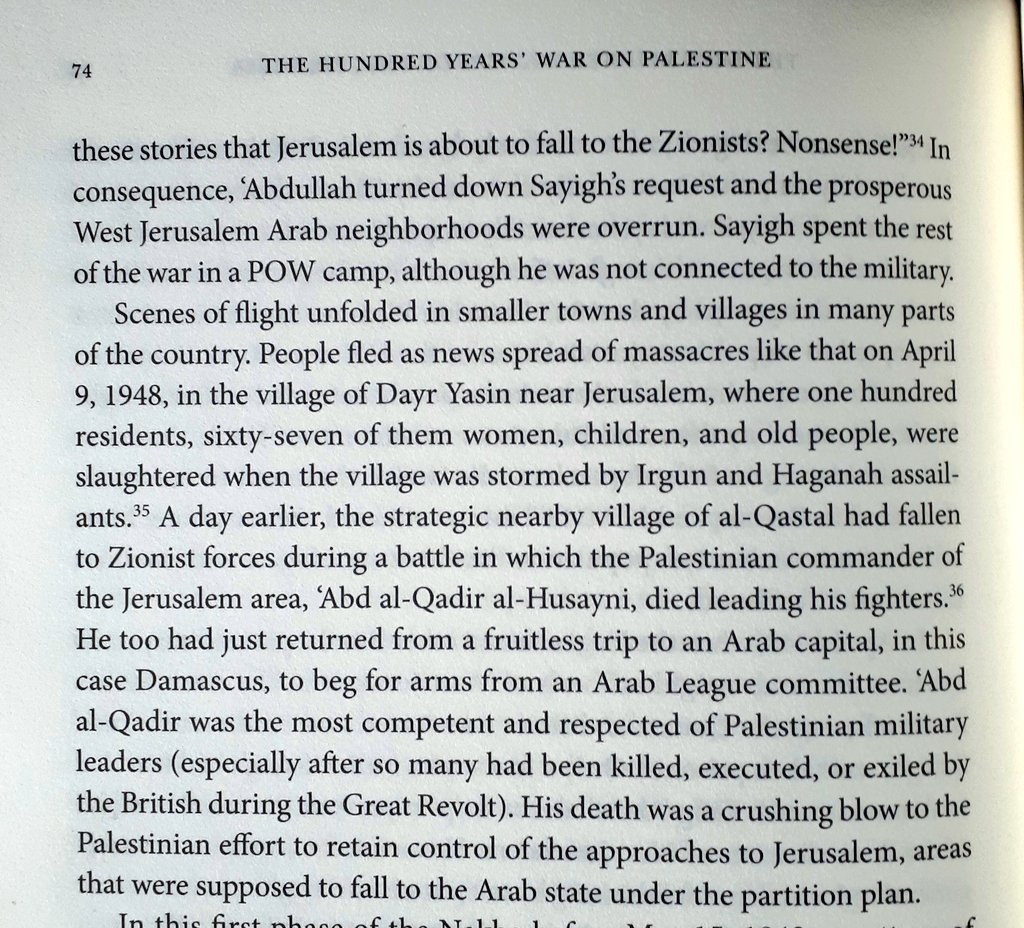
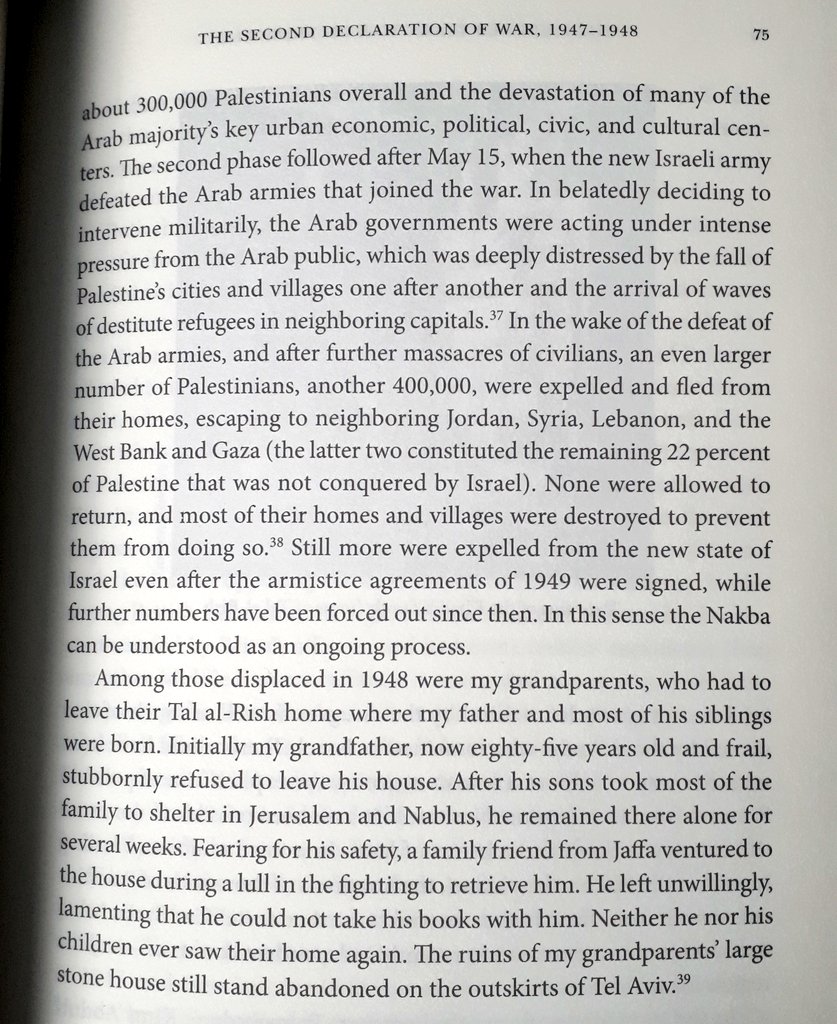
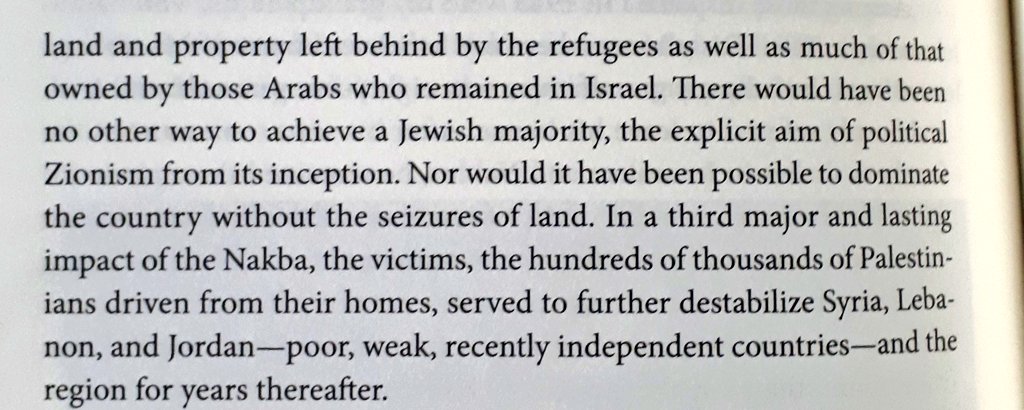
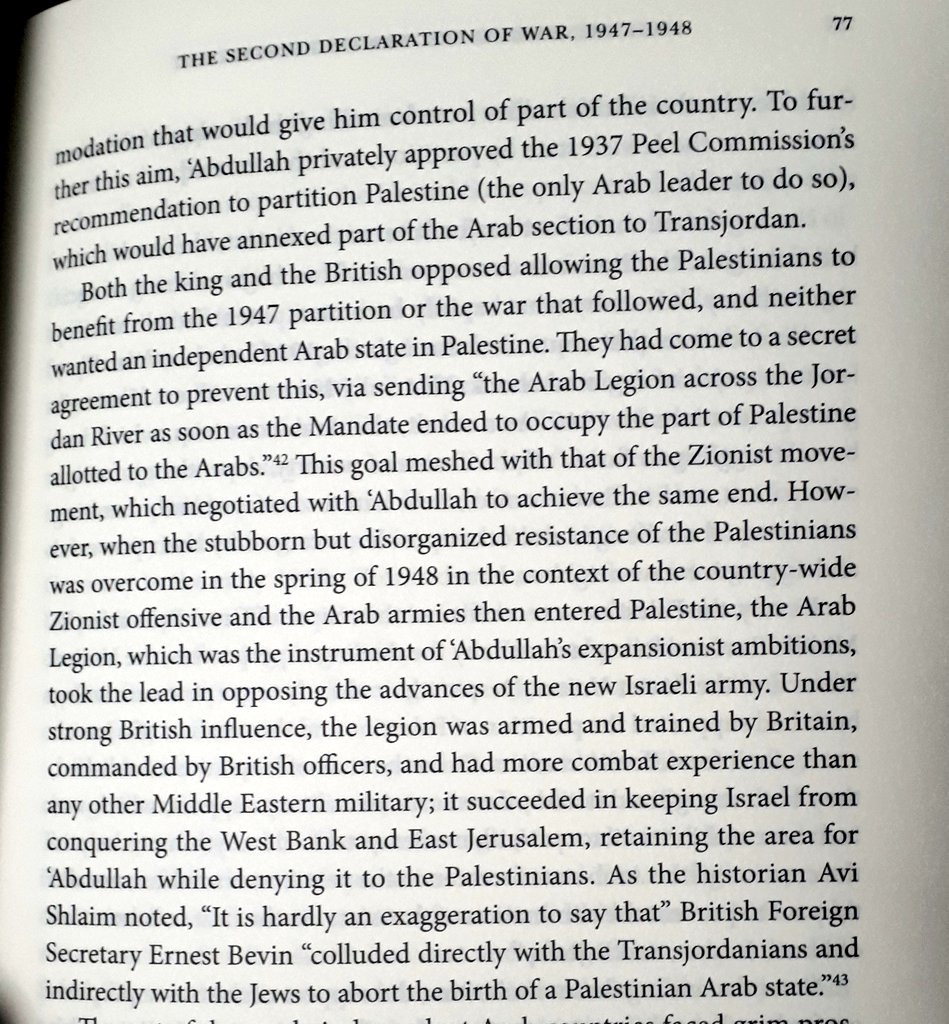
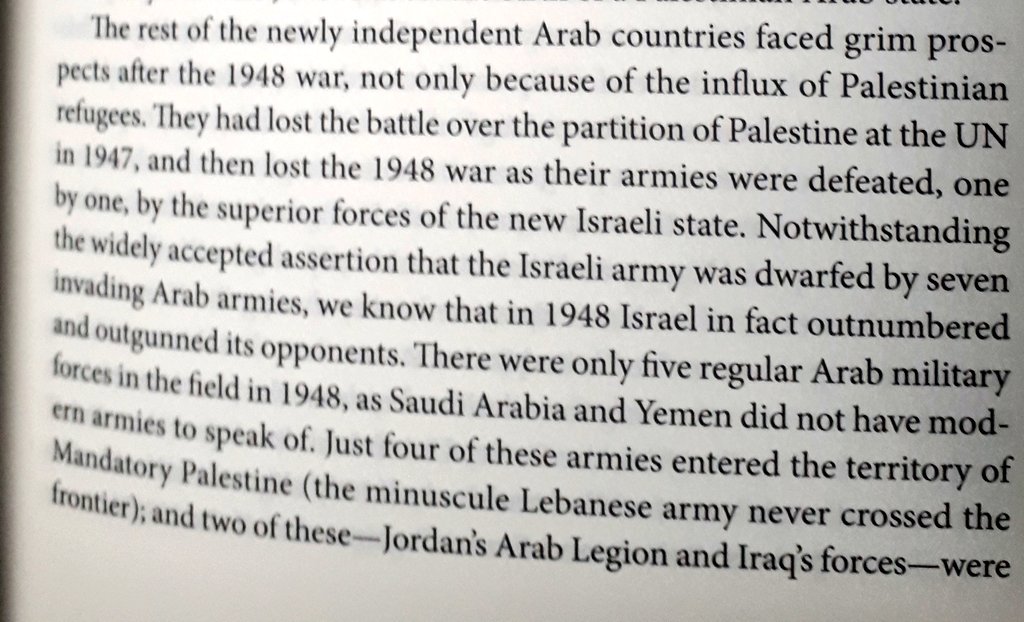
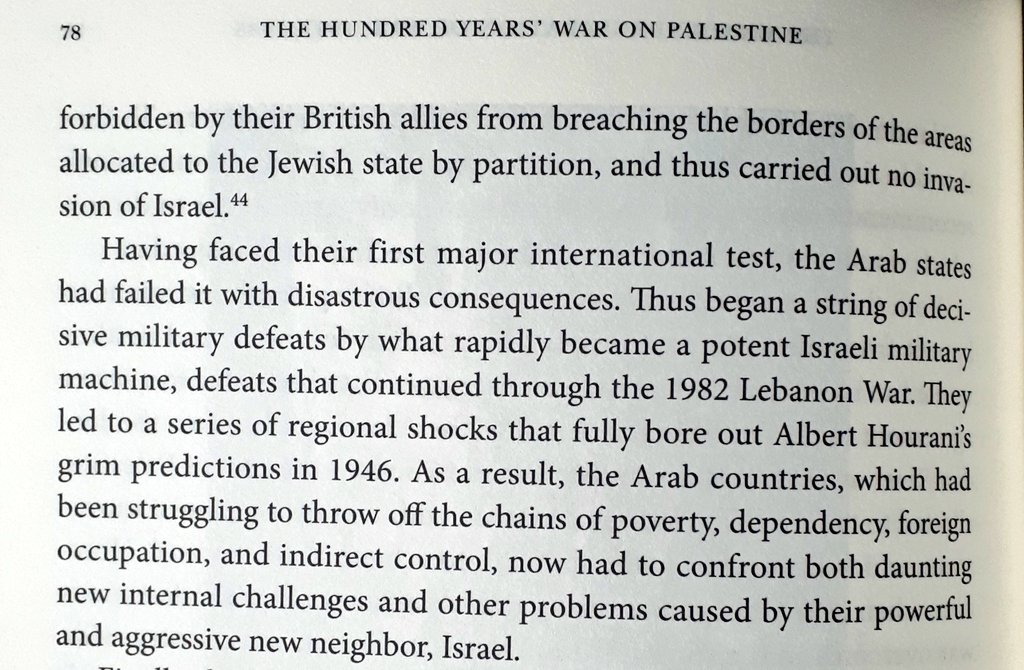
!["Despite theur already tense postwar rivalry, both [the USSR & the US] had supported the partition of Palestine ... Once the state of Israel was established, they both recognized it and offered crucial military support, which was instrumental in its victory" "Despite theur already tense postwar rivalry, both [the USSR & the US] had supported the partition of Palestine ... Once the state of Israel was established, they both recognized it and offered crucial military support, which was instrumental in its victory"](https://pbs.twimg.com/media/EYJbjDcWsAILEpd.jpg)
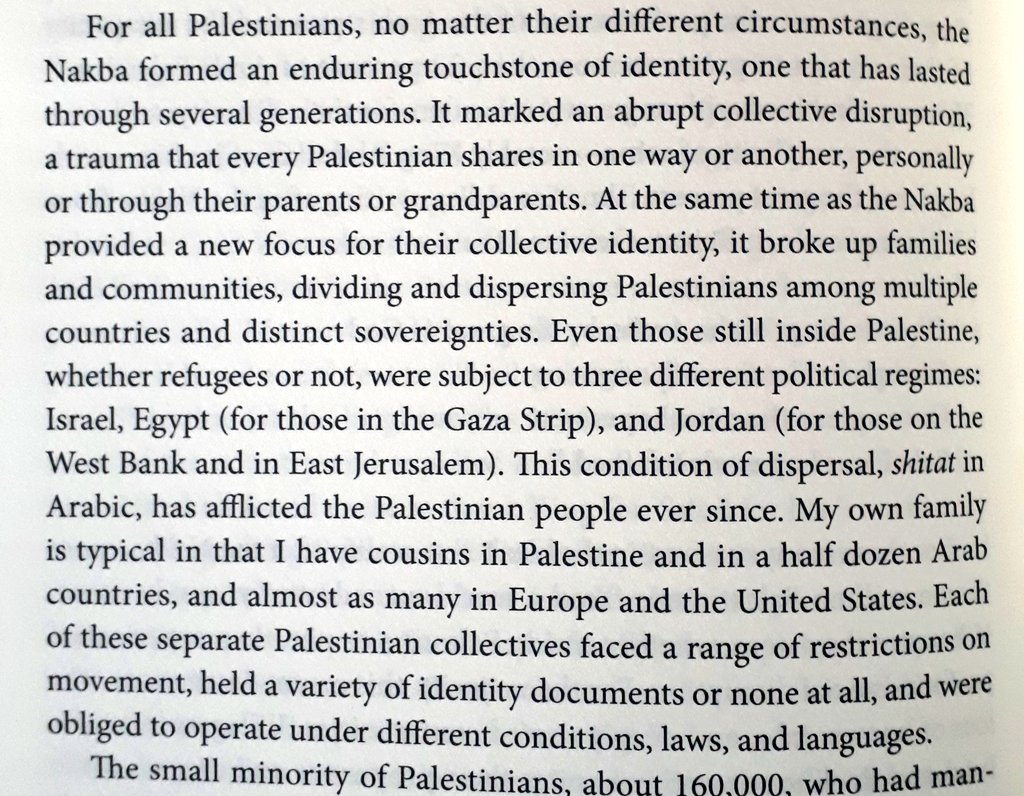
!["Accustomed to being a substantial majority in their own country and region, [those who remained] suddenly had to learn to make their way as a despised minority in a hostile environment as subjects of a Jewish polity that never defined itself as a state of all its citizens" "Accustomed to being a substantial majority in their own country and region, [those who remained] suddenly had to learn to make their way as a despised minority in a hostile environment as subjects of a Jewish polity that never defined itself as a state of all its citizens"](https://pbs.twimg.com/media/EYJ-NsQXkAMNAjO.jpg)
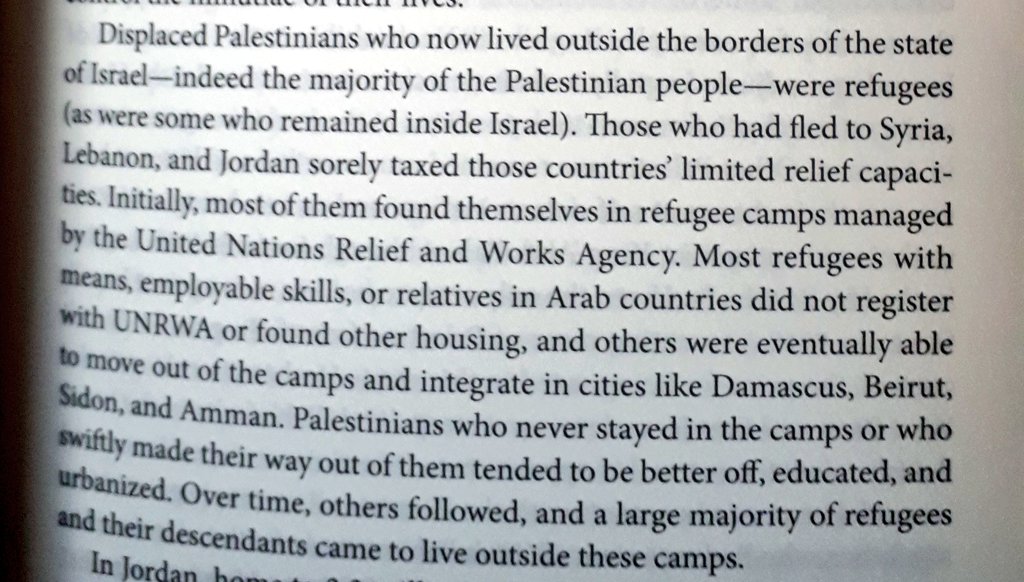
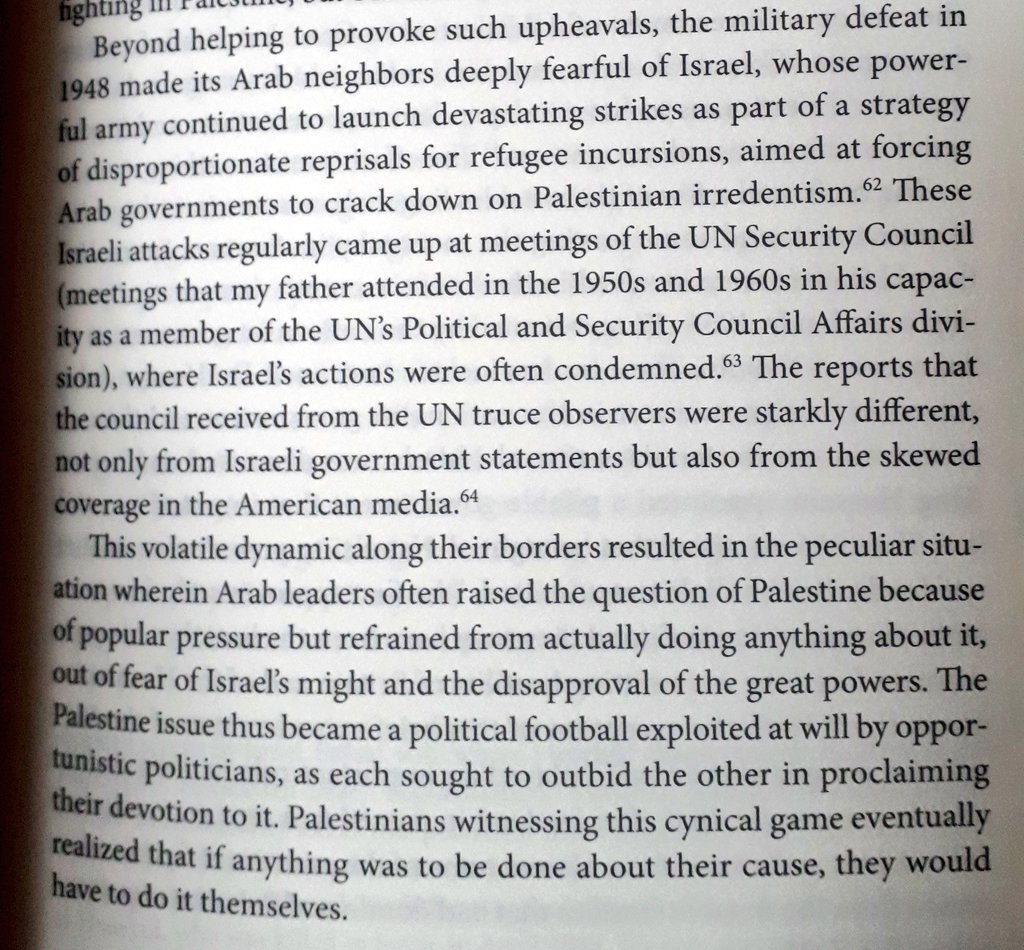
!["Transmitted through acolytes such as Moshe Dayan, Yitzhak Rabin, and Ariel Sharon, Ben-Gurion& #39;s belligerent policies [of unremitting application of force toward Palestinians & neighbouring states] have pervaded the Israeli government& #39;s dealings with it& #39;s neighbours ever since" "Transmitted through acolytes such as Moshe Dayan, Yitzhak Rabin, and Ariel Sharon, Ben-Gurion& #39;s belligerent policies [of unremitting application of force toward Palestinians & neighbouring states] have pervaded the Israeli government& #39;s dealings with it& #39;s neighbours ever since"](https://pbs.twimg.com/media/EYKLM6FWAAI4r3L.jpg)
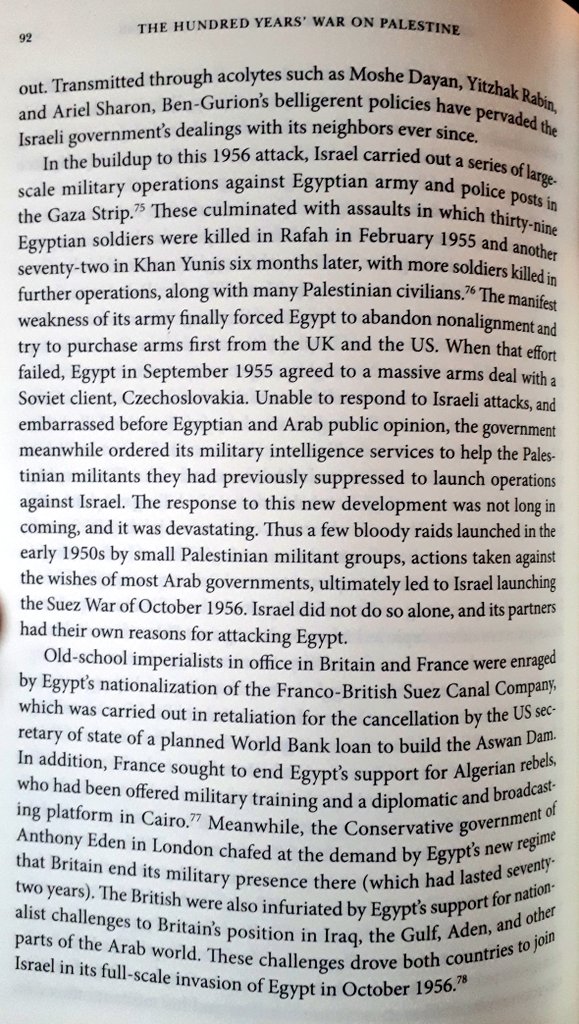
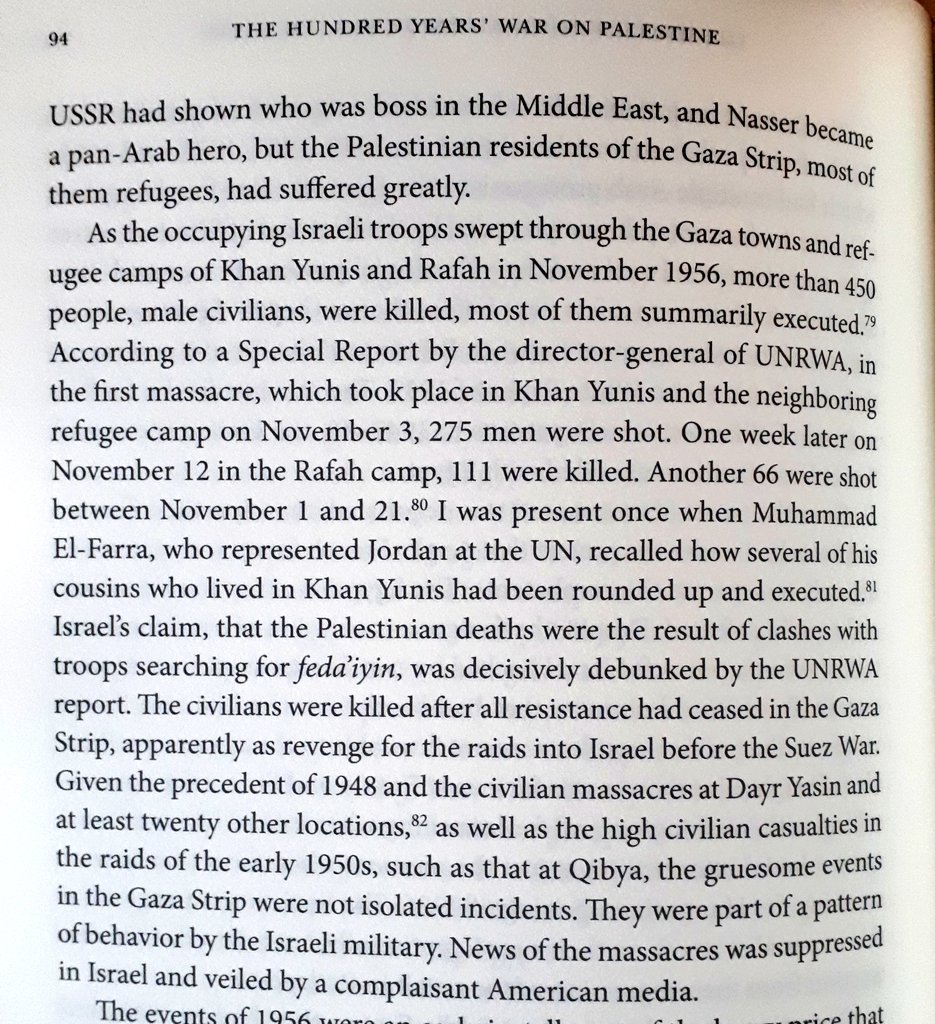
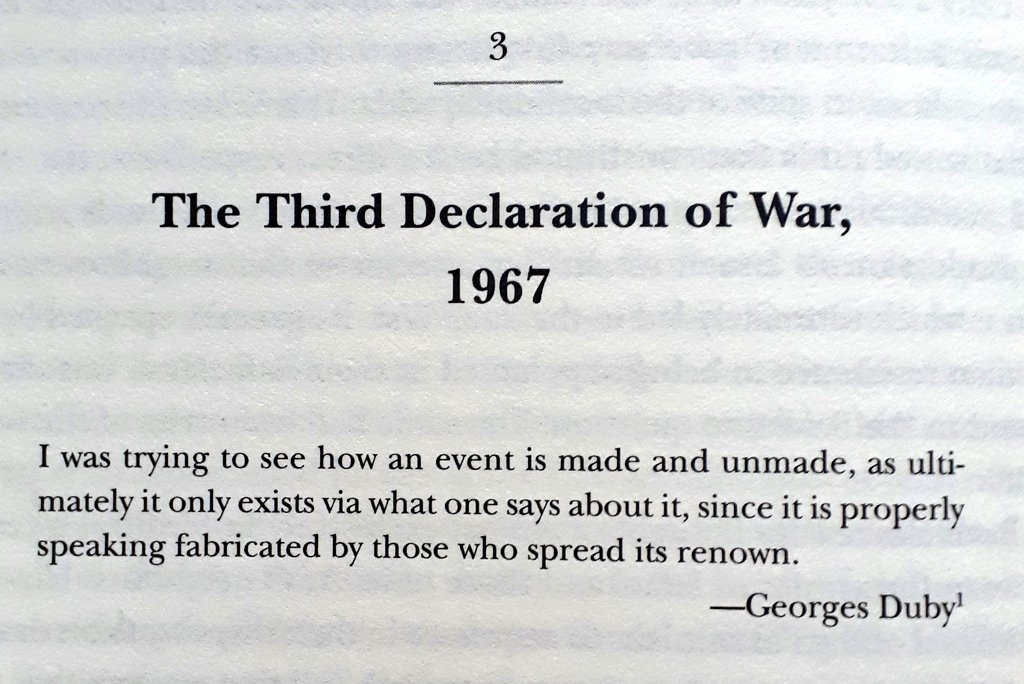
!["[Israel& #39;s] forces were much stronger than the Arab armies in 1967, & the country was never in any danger of losing a war, even if the Arabs had struck first. Yet the myth prevails: in 1967, a tiny, vulnerable country faced constant, existential peril, and it continues to do so" "[Israel& #39;s] forces were much stronger than the Arab armies in 1967, & the country was never in any danger of losing a war, even if the Arabs had struck first. Yet the myth prevails: in 1967, a tiny, vulnerable country faced constant, existential peril, and it continues to do so"](https://pbs.twimg.com/media/EYjzreeX0AEcxrc.jpg)

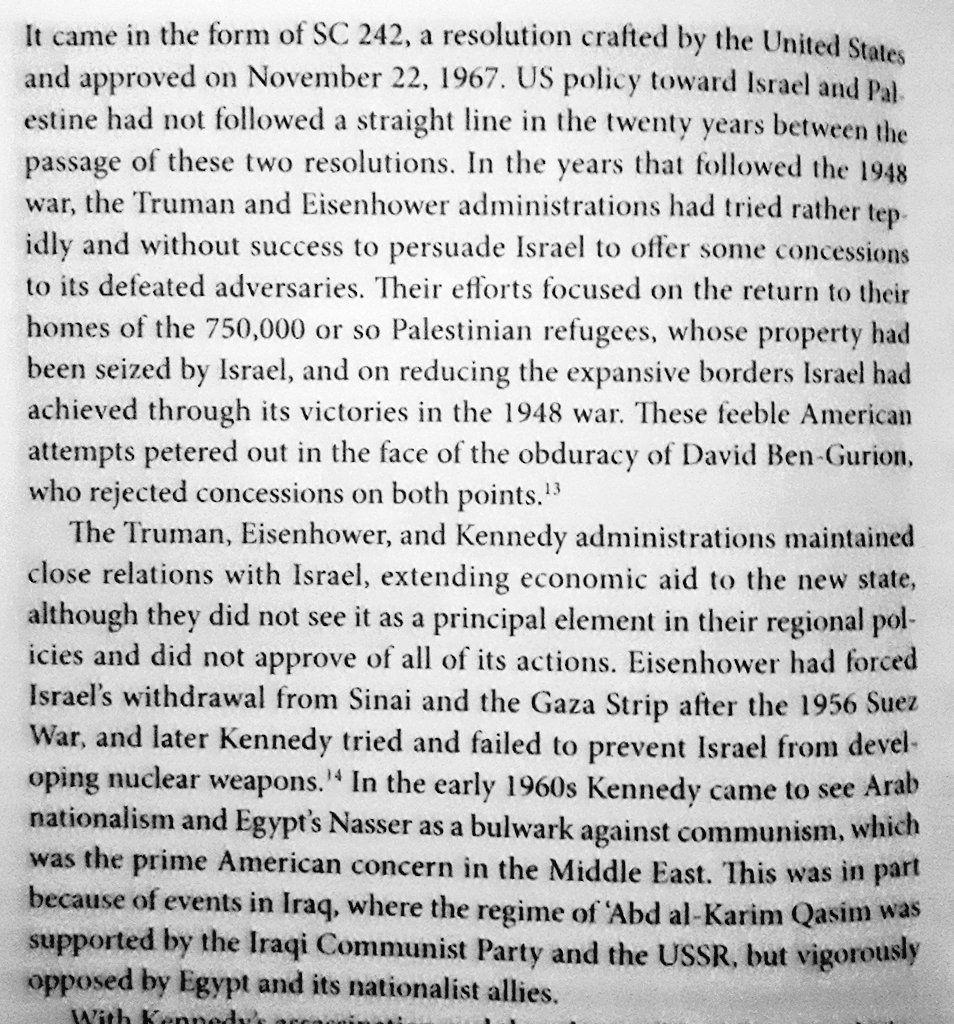
!["As [Israel] prepared in 1967 for a first strike against the Arab air forces, its leaders were determined to get prior American approval for their action, which they indeed obtained ... The Israeli military now had the green light it needed to launch a long-planned .. strike" "As [Israel] prepared in 1967 for a first strike against the Arab air forces, its leaders were determined to get prior American approval for their action, which they indeed obtained ... The Israeli military now had the green light it needed to launch a long-planned .. strike"](https://pbs.twimg.com/media/EYlaGlTXYAAkCNK.jpg)
!["Thanks in large part to [Security Council Resolution 242], a whole new layer of forgetting, of erasure and myth-making, was added to the induced amnesia that obscured the colonial origins of the conflict between Palestinians and Zionist settlers." "Thanks in large part to [Security Council Resolution 242], a whole new layer of forgetting, of erasure and myth-making, was added to the induced amnesia that obscured the colonial origins of the conflict between Palestinians and Zionist settlers."](https://pbs.twimg.com/media/EYlijanXYAIASse.jpg)
